#as if the critics were in any way as loud or popular as those worshipping it
Text
1 year since i got scammed by nintedno leaving me forever yearning for a game we will never get and an extreme worry for the future
#ganondoodles talks#zelda#dont think they will learn anything#i know its pessimistic but like#as if the critics were in any way as loud or popular as those worshipping it#i feel so bad for having contributed twice to its sales and earnings#i bought it normally (later sold that to a coworker) and the collectors#which i sold but i only got back the money a normal new one would have cost#and it was also only bc i was buying sth else and it was literally in prime condition#like he said it wouldnt matter bc he cant give me more but then even he said holy shit thats literlly like unopened lol#i mean ... most of it was never opnened xD just took the game out once and put it back once thats it#i feel extra scammed bc it was the first and only collectors edition i ever owned#and i dont think i will ever buy one again#and might regret that#i still wish i had known how much i liked botw to get its special one ... but i didnt have the money back then either way#but id rather miss out on that than spend so much money on sth i will forever regret having spend money on#and i worry for the future bc the “story is the least important part” guy and “lol you can only like the old games bc nostalgia” guy-#-being in charge of the franchise arent giving me much hope for anything better#especially after totks success
107 notes
·
View notes
Photo

Step 3: Ikenga
by
Omenka Egwuatu Nwa-Ikenga
"Ikenga m kwalu otu, njee mge ona mmuo"
(As long as my Ikenga is active I can wrestle in the land of the spirits)

Welcome back to the 13 steps. In Step one, you learned how ncheta (remembrance) is the basis for all the other steps. In Step two, you learned on the power of your potential & kinetic energies (Chi na Eke) and how important it is to make sure they are kept in harmony with one another. Now we will again return to a common experience that nearly all humans share. Unlike the first 2 steps, you should have quite a few memories of this one.
Do you recall the various things you wanted to be as a child? If you were anything like me, that list included alot of things through various ages. And do you remember what you did once you decided to be something? Well, you began in what is now called “make believe.” Without being coached or trained, you and your various playmates could pretend to be whatever you wanted and engage in any activity your minds could muster. You likely pretended to fight battles or engage in space exploration. Maybe you pretended to be a director and used dolls and toys as actors. The key takeaway here my brothers and sisters, is that you used the power of your imagination to create the reality you desired, even if it was a temporary thing
Now today, if you happened to stumble upon the “self help” section in any bookstore, or undergo any form of coaching or training, you will likely be told about something called “creative visualization.” A very simple definition of it would be utilizing the power of your imagination as an aide to getting better results in your life. Countless people have used it to beat addictions, overcome their fears, as well as acquire new skills. Sound familiar? It's once again a reminder of how you need to remember things as an adult that you did naturally as a child, isn't it?
Now remembering the lessons from “Step Two" and Eke have been with you as long as you’ve been on this planet, even if you’re not as in sync with them as you once were. And as I said in that lesson, Igbo culture (along with many others) left a number of reminders for you of the various things you came into the world knowing. The one reminder we will cover today is the one that goes by the name “Ikenga.”

This figure is shared amongst the Urhobo, Edo, and Igala, but the Igbo version is the most well known. Just like Chi na Eke, an entire series of books would be needed to properly expound upon Ikenga. One popular definition of Ikenga is "place of strength." However, for the purpose of this step, we will say that Ikenga is a symbol of achievement, especially through the use of your right hand. On a sidenote, it goes without saying that for most human beings, their right hand is their dominant one. For the 10% of you for which that’s not the case, just apply this same rationale to the hand that is your dominant one for this step.
The first aspect of Ikenga we will discuss is its appearance. They come in various shapes and sizes, but one key aspect is horns, typically that of a ram, which is prizes for its aggressiveness. Just like the ram, Igbos believe that one must plunge into a venture in order to succeed. Contrary to misinformation by Igbo Christians, Ikenga, much like other sacred objects, was not an item of worship but a visible representation of things that were invisible. In this case, Ikenga represents your divine self image. In other words, a self image based on your Chi (your unlimited potential), working in unison with your Eke (your limited kinetic energy). Ikenga is thus said to be a gift or symbol of one’s Chi. Anyone who has either achieved consistent success or studied/coached those who have, is aware of how critical having a healthy self image actually is. With an unhealthy self image, your numerous self doubts will usually defeat you before you even get started. Even if you do happen to achieve success despite a negative self image, you will likely be the victim of your own self-sabotage.


"Ebune jị isi éjé ogụ" (The ram goes into a fight head first)
Ikengas were not limited to individuals, but communities could also have them (sometimes called Ikeoha). These communal Ikengas were representations of the achievements and ideals of a community. The Ikenga of the United States of America holds a torch in her right hand, and stands tall in Liberty Island in New York Harbor


The second aspect of Ikenga we will discuss would be its adaptability, meaning its ability to change. Young men would typically get an Ikenga carved when they began their various vocations. In some ways, you could say it would be very similar to receiving a diploma in today’s world. However, an Ikenga was not permanent, and it could evolve as the owner’s roles changed. A young man whose main task was defending his village would receive a warrior’s Ikenga holding a sword, whereas when that same man became a more accomplished elder, he would now have a title holder’s Ikenga holding a sacred staff. Alternatively, if a man chose a profession that didn't bring him much success, he could throw away the Ikenga (self image) that was not helping him and choose a new Ikenga (and possibly a new profession) that did.
Ikenga adighi ile, azilaa ya nku" (An Ikenga that is ineffective, cut it for firewood)
The third aspect is persistence. Once an Ikenga was established, a routine was established to straighten it. Regular offerings of kolanut, alligator pepper, and libations were made to it, often during the igo ofu ututu (traditional morning prayer). To the uninitiated, it would appear that the Ikenga itself is being worshipped, but I want to reveal a secret to you: If one makes a prayer, whether spoken out loud or silently, your mind cannot help but create a mental picture of whatever choice of words you use. For example, if I mention a pink elephant, you can’t help but imagine one. The same applies to things like positive thinking, affirmations, proverbs, etc. What would happen if you constantly reminded yourself of your goals? Regularly repeated words of encouragement and positivity? And returning back to your childhood, how powerful could your imagination be when if it focused on a long term goal? And even more so when you also dedicate yourself to constant practice and honing of your skills?
"Ikenga chim nyelum, taa oji" (Ikenga, gift of my chi, participate in the offering)
So in summary, an Ikenga is a divinely based self image, that changes as needed, and is fed/reinforced by persistence and dedication. And here’s a final thought my brothers and sisters. One thing about dedication is that you must accept that you’re typically not going to be very good at most things at the beginning. In fact, you’re very likely to be quite bad. However if you stick with it and learn from your mistakes, not only will you improve, you will likely become quite good.

At some point you did not have the ability to read these words at all, but through repetition and practice over time, you gained that ability didn’t you? The same applies to just about everything you now have the ability to do (walk, talk, drive, write, etc). So instead of saying that you cannot do something, you should say you haven’t done it yet. The former may or may not be true, but the later definitely is. With a harmonized Chi na Eke (as well as working in conjunction with others), the only real limit in this universe you probably have is time. So if that's the case, why are you limiting yourself?
Step 3: I choose a divinely based self image that helps me creates the results I want and can change it when it no longer does so.
Action item: Create an Ikenga. You can draw it, or just write a description of it. Make sure to mention it in your daily prayer from step 2. Include the type of life you want to create as well as some of the goals you want to achieve. And stay tuned for step 4, which is coming out on the next new moon, November 15. Yagazie (It shall be well with you).
#arochukwu#igbo#kemetic dreams#odinani#african spirituality#african culture#african#africans#ikenga#ram#omu#chi#ncheta#eke
92 notes
·
View notes
Text
i wanna talk books so I made a meme
@doorsclosingslowly here’s the answers to your questions :)
6. If you read in more than one language, is there a difference between the experience of reading in your native language(s) and reading in other languages?
Virginia Woolf has a great quote in A Room of One’s Own where she says that women writers need to develop their own “sentence” and that this can only be developed through creating a tradition of female writing. She says that while reading male writers is pleasurable, it isn’t useful for the female writer, that she can’t learn from the way men write. Their “sentence” isn’t suitable for female writing. I’m.... unsure of how much I agree with her on this but I find the theory useful for describing how I approach literature in Spanish vs English.
Especially in terms of language, not so much in regards to narrative or worldbuilding or even themes, I find Spanish to be pleasurable but not useful. I very rarely find myself reading something in Spanish and thinking “ooooh, I wish I could do that! I want to steal that! How did they come up with this?” The “sentence” for writing in Spanish isn’t one I recognize or want to imitate... except maybe for VERY few exceptions like Carlos Fuentes and Borges. Whereas I can spend a lot of time reading English un-selfconsciously and then suddenly be struck by a turn of phrase that I must somehow or other make my own. That almost never happens to me when reading Spanish.
9. Fiction or non-fiction or both? In what ratio? Where do you draw the line between the two?
Oh god, this is embarassing. Erm... fiction to a fault. On 2020 and 2019 I did try to make a concerted effort to read more nonfiction, ESPECIALLY more popular science books. I still kind of childishly consider myself to not be “smart like that” and that science isn’t for me, because I don’t understand it. I used to think science fiction wasn’t for me, for similar reasons. When I do read nonfiction it tends to be history and literary criticism.
I’m finishing my degree on English literature and though I had a period of hating hard on literary criticism, I think it was mostly me rebelling against the French brand of it. I HAVE to admit I love reading new historicism, especially now that I’m working on my dissertation and I had to read a lot on Elizabethan and Jacobean theatre.
Hopefully 2021 will be the year I read a bit more science.
11. The worst book hangover you’ve ever had
Augh... I remember two in recent years. Let me see... in 2017 I finished the last book in the Realm of the Elderlings. I had read the first book in the series around maybe the mid 2000s. I devoured it in a single weekend, still hungry for more of the story. I did not have access to the rest of the trilogy for a couple of years after, but as soon as I got them I read them as fast as I could. I remember reading those books during class, pretending to pay attention to a lecture on Linguistics but actually fully engrossed in Robin Hobb’s world.
It’s a world that was with me for more than 10 years. Characters that I knew intimately from multiple re-readings for more than 10 years. My dissertationg is about the first trilogy for crying out loud! I hadn’t wanted to read the last trilogy and the last book on the trilogy because I didn’t want that connection to end. But finally I gave in...
It was a book hangover because I was reading late at night when I realized, halfway through the book, a character I loved deeply was probably going to die and I just HAD to know, I HAD to be sure. So I read through the night going from disbelief to anger, to grief, to grim acceptance. I wasn’t able to put down the book until 11 am the next day, by which point I was openly sobbing and would have thrown the book across the room except I think I was reading in my computer.
The second book hangover I remember was less because of sprinting through the book and more because of the circumstances. Last December I had decided to finish as many books I could in hopes of reaching my Good Reads goal (which I didn’’t) and I was going through His Dark Materials pretty quickly when on the 25th I got the news that my grandmother died. I wasn’t able to go see her at the hospital or at a funeral, or even go see my dad and uncles because she had died of covid-19 and the situation was still pretty dire in the city.
Then Philip Pullman decided to be an absolute asshole to me and the characters in his book arrived to the Land of the Dead. Being an atheist fantasy series and me having just recently come to terms with the fact that I’m not even agnostic... it was very tough to go through Pullman’s exploration of mortality and the importance of life on Earth. I agreed completely that materiality and the here-and-now far outweigh any contemplations of an afterlife... but my grandmother had died very suddenly.... she had still been a pretty strong old lady before she contracted covid... I had spoken to her a couple of days before and she was still strong enough to bitch about litter getting inside her room...
I finished The Amber Spyglass in a rush as well and somehow it got mixed with my mourning process and my anger at myself for having taken my grandmother’s life for granted... for not having cherished the materiality of her existence when I had the chance... I hadn’t finished writing my dissertation’s first draft yet and there were some heavy issues going on in my household.... I was exhausted from having to survive the year and I think I still am... and it all mixed up with the bittersweet ending of Pullman’s His Dark Materials and the inevitability of loss... all I remember from between the 25th and the 31st of December 2020 was exhaustedly reheating Christmas food, trying to write, and slogging through The Amber Spyglass... it feels like it was a week-long literary hangover...
14. The book that, in hindsight, really should have clued you in to the fact that you’re _________ (queer/in love/doomed to be an academic/etc)
So this is slightly NSFW but I should have known, and stopped being such a snob about it, that I had WAY MORE in common with the furries than I cared to admit given that my first impression of Smaug the Golden when reading The Hobbit at the tender age of 8 was “wow! he’s dreamy!” *facepalm *(also betraying a worrying tendency to crushing on irredeemable assholes and other miscellaneous villains...) I have accepted my status as a weird monsterfucker AND a weird alienfucker. Inhuman anatomy makes me hot, and I should have known it from DAY ONE!
23. The book you expected to hate, didn’t, and then got angry about not hating
The Hunger Games, which I’m STILL salty about and will probably remain salty about for the rest of my life.
I hateread it because a friend told me about how he hated it, given his bitter ex loved it and though I agree with all his criticisms and have a bunch of my own... I still cannot stop finding stupid Katniss profoundly likeable! CURSES! A pox upon your house Suzanne Collins! I still think your dystopia is a cowardly, white-lady-who-has-never-feared-state-violence dystopia, I still think your love triangle was absolutely unnecessary and I still think you tried to cop out of admitting you (and your character) like pretty dresses by making the pretty dresses compulsory. Be brave! Don’t give me this “I’m not like other girls” bullshit! Be brave! Make your violent spectacle reality show as a criticism of the USA’s consumerism and callousness a voluntary thing! Don’t wash your heroine’s hands clean of the sin of wanting fame and fortune and survival at all costs!
But... fuck... I... still like Katniss... I’m glad little girls in 2008 got a heroine who kicked ass, looked good and wasn’t a perfectly strong and powerful person all the time. I’m glad they got competence and vulnerability... Fuck my life...
31. Bonus question: rec me something!
This is hard... since I get the feeling we have very different tastes in reading material but... If you haven’t heard of the Vampire: The Masquerade roleplaying game (or even if you have) take a crack at the Baali Clanbook. Even if you don’t understand the game mechanics I think you’ll enjoy the history portion because it’s about a clan of devil-worshipping vampires who do their devil worshipping through implanting evil insects on people... and I suspect it might be up your alley...
4 notes
·
View notes
Text
The Sakamakis as Parents
I got an ask for some Pregnant Yui headcanons and for the brothers as fathers but I accidentally deleted it. I'm not that great at headcanons so this came out as more of an analysis because as usual I am way too passionate about looking at a fictional series through a realistic lens ><. Be prepared, this won't be a popular opinion. This is based on the og dialovers personalities from Haunted Dark Bridal.
So, the Sakamakis all have issues with control, and they use fear and intimidation as a way to keep that control. They've done that for hundreds of years, and as unpleasant as it is to think about because we love these characters, they probably aren't going to change their sadistic abusive behaviors just because they become fathers.
In HDB, Yui didn't change the brothers with her love. That kind of thing came in later games. In HDB, she had to change herself in order to survive. She had to throw away her religion, her sense of self, to adapt to the particular brother that she chose. The brothers weren't the ones who changed -- and they remained abusive all the way through.
And I don't think they would be any different if they were to become fathers.
I do believe that all of them would feel far more protective of Yui and their children.. but they aren't going to suddenly turn into men who have mutual respect and love for Yui. They see Yui as a possession, someone they own, and I think there's a good chance they'd view their children the same way.
Obviously I don't think they'd be that way all the time. Even in the game they aren't always abusive; as with all abusers, they have their moments. And maybe those moments would be more frequent with their children. But being a parent is a trying thing even on the best of days. I worry how they would be on days where kids are being kids, pressing all the wrong buttons. I cannot imagine any of the brothers dealing with that in a healthy, calm, disciplined way that validates their children in a positive manner.
I don't think they'd treat a pregnant Yui much different either. They've never learned how to behave selflessly, and they've never been around pregnant humans. They aren't going to be aware of Yui's needs, nor be willing to give up their own needs to serve hers. (The exception to this would probably be Reiji. He would likely read everything there is to know about pregnancy and would ensure that Yui got proper rest and nutrition. He might rub her feet out of necessity to help the cervix ripen rather than to help her feel better. Subaru too might treat her with more care, though I could also see him avoiding her, afraid that he might ruin the child inside her or that it might be a monster just like him.)
Yui would do the best she could, and she would try to make things as good as she could for the kids, but parenting is the hardest job in the world -- and she would have to do it while fending off abuse herself.
Ultimately she wouldn't be able to stop the damage. And in some ways, that could make it worse if the kids didn't understand that she didn't have a choice. They might end up blaming her someday for never leaving, as abused kids often do.
In fact, much of the abuse doesn't even need to happen to the kids. All they have to do is witness it happening to Yui and they'll be traumatized.
The kids would never know what a healthy, respectful marriage would look like. So the cycle of abuse would likely be perpetuated, probably with daughters ending up in abusive relationships and boys ending up as abusers.
Parenthood can also be triggering for parents that were themselves abused in childhood. It is entirely likely that the brothers' trauma would be triggered by their own children. It is not uncommon for children to become the target for their parents' misplaced rage and ptsd that they might have towards themselves and their own parents.
As much as we all wish the opposite were true, I just can't see the brothers suddenly stopping their sadistic and abusive behaviors just because Yui gets pregnant.
So since his went on long enough, here are some individual headcanons I did manage to make:
Shuu:
Leaves most of the parenting to Yui
Might feel anger towards a lazy child (because he sees too much of the things he hates about himself in his kid)
Might have difficulty connecting with a child who bottles his emotions the same way he does, creating a nonexistent father/child relationship
On the flip side, a child with Reiji's work ethic might be disgusted by having Shuu as a father, causing them to have a fractured relationship
Reiji:
Would be an authoritarian, controlling parent
Would be overly critical
Would be critical of Yui's parenting
Would berate Yui in front of the kids
Would openly despise a lazy child
Ayato:
Gets jealous of the time, attention and affection Yui gives his kids
Verbally berates Yui in front of the kids when he is pissed at her
Continues to call her Chichinashi in front of the kids (for those that don't know, that literally means Titless. Imagine your dad calling your mom that ><. Not a great role model for respect)
Would get pissed at his kids if they didn't practically worship him as the best father
Kanato:
Gets ragefully jealous of Yui's attention that the kids take away from him
Would have major issues with a boisterous, loud child
A shy, sensitive child would be even more anxious and fearful with him as a father
Would scream at them for breaking his dolls
Also would teach them how to make dolls
Laito:
Would be too permissive, letting the kids get away with way too much
Would undermine Yui's parenting boundaries, such as letting them stay up way too late and eat candy when she said it was time for bed.
But he would lose his patience with them when they go too far
Continues to call Yui Bitch-chan in front of the kids
Doesn't alter his language in front of the children
Is wildly inappropriate around them (doesn't hide his pevertedness)
I want to say that Laito would never sexually abuse his kids. But I truly don't know about that. For Laito, love equals sex. I wonder if he would have issues understanding where to draw the line.
Subaru:
Would lose his temper around kids when they press his buttons and would later feel guilty about it but not know how to apologize. This would cause rifts with his children
He would probably further avoid them, to avoid "dirtying" them.
Would scare a shy child with his temper making them more fearful
(Also none of this takes into account whether Yui is a vampire or not. That could possibly change the dynamics. Might also make their kids more murderous and messed up. Either way, sad to say but the kids are not gonna turn out fine 😢)
217 notes
·
View notes
Text
How Many Completely different Genres Of Popular Music Are There? No. You are Flawed.
Genres in music are like branches of a tree. This can be a superb thing, culturally talking. The national music scene has never been this diverse. Too typically, particularly in rock's heyday, http://www.audio-transcoder.com/ it was dominated by acts that made their bones from taking nonwhite music and sanitizing it for white audiences. That custom undoubtedly lives on, in musicians like Justin Bieber, but the pop charts and critics' notebooks precisely replicate the American mosaic in a manner that they actually haven't earlier than. We could also be in the midst of a big leap backward as a rustic, but at least the music is good. Even the country charts are fairly woke.

Music Genre Classification is without doubt one of the many branches of Music Information Retrieval From here you can carry out different duties on musical data like beat monitoring, music generation, recommender methods, track separation and instrument recognition etc. Music evaluation is a various discipline and also an attention-grabbing one. A music session someway represents a second for the person. Discovering these moments and describing them is an interesting challenge within the subject of Information Science.
Every technology seems to offer the subsequent one crap for its music. (See what I did there?) I teased my dad and mom about their disco till at some point all my Green Day and Good Charlotte sounded dated in my headphones. Previous people" used to inform us children that our songs have been a mirrored image of our disintegrating values, that music was worse than it was once. Positive, they missed their Elvis and their Bee Gees, however they also missed the days once we appreciated good morals. The lyrics we mouthed, the artists we worshipped, the genres we bumped were all proof of society sliding into the sewer.
Maybe unsurprisingly, Kenny finds that accidents - including car crashes and drug overdoses - are a huge reason for premature death for musicians, accounting for nearly 20 percent of all deaths throughout genres. But accidents are much more likely to kill rock, metal and punk musicians. Punk and metal musicians additionally appear prone to suicide, whereas gospel musicians had the lowest suicide charge of all genres. Homicide accounted for 6 % of deaths, however was the reason for dying for an unimaginable half of rap and hip hop musicians in Kenny's pattern.
Overall, I think this project was an effective way for me to department out of the musical genres I most resonate with, and to teach myself on the history of different musical genres. In hindsight, I would have loved to include a bit and even dedicate a complete undertaking in direction of discovering the extent to which sexually explicit or violent content inside songs affect a person. This thought occurred to me once I finished a class on the College of Rhode Island which lined intercourse and violence within the media. It will have been interesting to compare the lyrics of recent songs the lyrics of older genres and see in the event that they correlate. I additionally wished to reflect on the part in my poster that includes responses to the query: what impression does music have on society". There wasn't one participant who had anything adverse to say about music, which helped me to appreciate simply how vital it has and will at all times be.
Let's return to the question of Ambient vs. New Age music. In their lighter", commercialized form, well known for the reason that '80s, these may be some gently flowing, predictable pieces of music, typically utilizing just a few fundamental chords, inspiring melodies and easy, most likely synth - based instrumentation, with frequent use of piano and strings (or string-like synth pads), maybe some arpeggiated synth elements. However, in the late '60s, pioneers of digital music were already engaged on a compositionally and aesthetically a lot deeper degree to create Ambient items (and New Age music later within the '70s).
The 2 albums generally credited with laying down the style's sonic and conceptual framework have been Chuck Individual's 2010 LP Eccojams Vol. 1 (a Daniel Lopatin , aka Oneohtrix Point By no means, facet project) and Far Side Virtual (2011) by James Ferraro. Whereas Lopatin sampled from Eighties pop songs and fused them with the 1992 online game Ecco the Dolphin, Ferraro aimed for ringtone music" by sampling issues like the Skype log-in sound and being inspired by Brian Eno-composed Home windows ninety five tone, although his music usually may sound like Philip Glass or even the experimental digital music of Laurie Anderson. Whereas its day has come and gone, these two Vaporwave artists and others like Vektroid—whose album Flortal Shoppe beneath the Macintosh Plus moniker is perhaps the genre's defining document—are still making and releasing new music.
This compendium of differences between the cultures of jazz and classical musicians is a supply of ever-rising fascination to me. I used to feel pissed off when a violinist couldn't play a groove, or when a jazz pianist froze up in front of a written passage. However actually these are simply manifestations of variations in brain structure, variations in coaching, and finally differences in culture. When you incorporate individuals with such variations into your music in an adroit manner, you may—as a substitute of shedding one thing—augment your sources to create an art that's tremendously multifaceted and rich, that celebrates and even thrives on difference.
Mr. SINNETT: With jazz? You understand, it is fascinating as a result of I used to be a musician, truly, once I first heard jazz, and once I first heard jazz - I wasn't enjoying jazz, I used to be playing traditional soul music and rock and funk and those sort of things, however after I first heard jazz, I actually did not get it because it was the whole antithesis of every thing I used to be playing at that second. In different words, you had - I was coping with music that you just had quite simple, repetitive rhythmic devises in the music. It was primarily based on a groove, a specific sort groove. The concord we had been coping with was at a much decrease level in terms of complexity and it was primarily vocal.
For these of you who assume that heavy metallic consists of the singer screaming as loud as they can, the guitarist playing the guitar as quick as they will, and the drummer banging on the drums as loud as they will, just take a moment to suppose: would it not ACTUALLY be that widespread if it was simply so simple as that? Strive listening to any heavy metal song. You may be pleasantly shocked, I promise you. The lyrics have a much deeper meaning than virtually every other style of music, and don't let the way some bands current themselves off the stage put you off. I do not prefer it when bands gown up in all-black and wear black make-up and all that stuff both, but attempt to just think about the music. There's much more to it than you suppose there is.

1 note
·
View note
Text
Character Information
Full Name: Rachel Barbara Berry
Age & Birthday: December 18, age 16
Gender Identity: Cis Female
Preferred Pronouns: She/Her
Romantic Orientation: Biromantic
Sexual Orientation: Bisexual / Attentionsexual
Hometown: Lima, Ohio
Family Information
Mother: Shelby Corcoran
Father: Hiram Berry, Leroy Berry
Siblings: N/A
Pets: Rachel would love to keep chickens or something equally homey in which she could dedicate a chapter of her memoir to the simple life she had keeping chickens. However, an unfortunate experience with eggs has ensured she has an entirely new chapter regarding chickens planned.
Other Family Members of Importance: No other living relatives
Financial Status: Middle class. The Berry family are by no means rich, but Rachel has never had to struggle for anything. They are entirely comfortable, her fathers have successful careers and aside from having to attend public school, Rachel never goes without.
Please describe your character’s family dynamics: Rachel was planned, bought and paid for. A baby that was desired and extremely wanted. Her dads have worshipped her from birth, she has never wanted for anything her entire life. Rachel had never had chance to form a pout, or develop a fever before attention was given and any hurts soothed away. Her parents are loving and attentive, and perhaps overly indulgent. They have their family traditions, movie night, musical theatre night, karaoke night and at least once a month will sit and watch home movies which include, and are most definitely limited to, a highlight reel of all Rachel’s achievements. Her fathers were grown, successful men by the time they had the finances to be able to afford to create a baby, so she only had one set of Grandparents on Hiram’s side until she was eight years old. The Jewish faith and adherence to the religion even though she isn’t particularly religious herself, came from the relationship with her grandparents, and a way to honour their memory, when it’s not being honoured in song form.
Personality Information
Positive Traits: Caring, talented, dedicated, loyal, loving
Negative Traits: Selfish, insecure, desperate, obnoxious, blunt
Star Sign: Sagittarius
Likes: Broadway, Gold stars, Singing, Animals, Writing strongly worded letters, Herself, Sweaters, Knee socks, Old movies, Pink, MySpace, Attention, Admiration, Praise
Dislikes: Meat, Rudeness (in others, not herself, obviously), Bad singing, A lack of dedication, Slushies, Eggs, MySpace comments, Being ignored
Pet Peeves: A lack of ambition. She cannot understand it, nor can she keep her mouth shut when she notices it in others and when people sing through movies (unless it is her).
Most Embarrassing Memory: Being egged by vocal adrenaline. Rachel is very rarely embarrassed by her own behaviour, she is able to rationalise her own embarrassing traits to herself and what others may cringe at, she takes pride in. Being egged was something she hadn’t prepared for, and had been completely mortified to not only
Hobbies: Singing, dancing, blogging, acting, vlogging, theatre, exercise, crafts
Guilty Pleasure: Vegan ice cream, she is an emotional eater.
Unusual Talents. She is excellent at scrapbooking, Rachel is terribly sentimental even if she doesn’t always seem as though she cares about more than herself. She longs to fit in and be accepted, so any happy memories that seem even a tiny bit like friendship are cherished and recorded. She has a talent for song writing not yet discovered.
Habits. Nail biting and playing with her hair when overly stressed
Schooling Information
Grade. Senior
GPA: Rachel puts effort into all of her studies, she is a perfect student and nothing less than the best is good enough for her. She may dot her i’s with hearts and stars alternately and assign herself gold stars for work well done, but she maintains a perfect GPA despite obnoxious habits. Although she would say, because of them.
Extracurriculars: Glee club, drama club, school council, dance
Character Development
Canon Integration:
I’d like to include her crush on Mr Schue and sending Sunshine to a crackhouse as episodes that happened during her past. I think they are important to her personality.
I don’t want to infringe on anyone who might play Jesse, so I will incorporate Shelby into future development plans.
I would however, like to include her experience of being egged by vocal adrenaline, but I am happy to have had that be another boy.
Plans for Development.
I’d like to explore her friendships, how they develop and how she becomes less selfish because of them. I’d be keen to explore possibly within the future her tendency to sacrifice herself for the greater good. She can be loud and obnoxious and incredibly selfish, but I’d like to explore how she changes because of the attention of those around her. Once she’s given the chance to be a friend, she can make a great one.
It would be interesting to explore Rachel’s sexuality in comparison to how she see’s herself. She imagines her life to be the standard, girl meets boy and falls in love and whilst that may happen, it would be interesting to explore her acknowledging at least that she has an attraction to women too, and that she can’t always control every aspect of her life.
I’d like to explore her issues with her mother and her feelings of being unwanted when it comes to her. She’s been worshipped by her fathers, but her mother very clearly did not want to be that to Rachel and as much as she pretends that she doesn’t need her, she desperately wants to be loved and longs for a maternal figure. During the course of the RP, I’d like to explore her writing to her mother and trying to form the relationship she desperately craves but isn’t going to receive.
It would be fun to explore Rachel romantically, she can be too much and doesn’t know how to pull it back. It would be interesting to explore how Rachel acts when she has genuine feelings and when she simply wants to be loved.
Character Biography (654 words)
December 18 was the date a star was born. Quite literally. The day one, Rachel Barbra Berry, entered the world and began her destiny to stardom. Born to gay fathers, Rachel was adored from birth. Never did a frown or pout have time to form on her face before her needs were attended to. Anything she desired, any dream she had, however far fetched, was made possible through the love and devotion of her parents. Rachel expressed an interest in performing and everything financially possible was done for her. She had acting lessons, singing, dancing, and was entered into every competition available in their small town and beyond.
When she was younger, she had not only the devotion of her parents, but that of her grandparents on Hiram’s side. Until her grandfathers death when she was 6 and her Grandmother's the following year, they had been two of her biggest fans. They would visit every weekend and sit patiently as Rachel performed song after song, applauding dutifully after each. Her grandmother had a love of animals and Rachel learned from her to cook and use only cruelty free products. Her devotion to a faith she isn’t strict with, came from a respect for the grandparents who loved her and a way of honouring their memory when sometimes, very rarely, a song simply wouldn’t do it.
Although her family life was close to perfect, Rachel always missed a maternal figure in her life. She certainly didn’t go without, and her dads provided everything they could. But she’d stand to the side for mother/daughter days, and would stare longingly at the mother's day greeting cards in stores, knowing she had no reason to purchase one. Sometimes she did, she’d write cards to the mother she didn’t have. She’d write about herself, and the problems that girls had as they grew up that she couldn’t always share with her dads. They’d prepared a PowerPoint on periods and puberty, had been sure to buy every single brand of sanitary products they could their hands on. But it wasn’t the same, there were things she didn’t understand, changes happening to her body she couldn’t account for and unlike other girls, she’d had to find those things out for herself. Rachel longs to find what she feels is a missing piece within her life, but is incredibly wary of seeming ungrateful for the amazing life her parents have provided.
Whilst her home life was filled with love, laughter and joy. Rachel had never had the same experience with school. She very rarely related to her peers and whether that was sometimes through no fault of her own due to living in Lima and having two dads, a lot of it came down to her spoiled nature and overbearing personality. She went through her younger years longing for a friend, and yet driving anyone away who tried to be that. She was overly critical, bossy and often too much. She wasn’t afraid to speak her mind and had many delusions of grandeur when it came to her own talents. She’d thought that might change in high school, a chance for a fresh start, but her interests simply didn’t line up to those of her peers. They were never going to make her popular and well-liked and instead of conforming, Rachel went the same way she always had and over compensated her loneliness by being loud and obnoxious in a desperate bid for attention and admiration.
Since finding glee she’s made steps towards creating true friendships. She can still be overbearing, she can be bossy and selfish at times. But she cares and she’s learning to allow others to shine, even when she wants to take the spotlight for herself. Rachel is slowly learning how to make lasting friendships and is hoping to be able to fill the memory board in her room with something other than certificates of her achievements.
1 note
·
View note
Text
Audience Studies (3P18) Blog Post #1 - Ethan Limsana
During the introduction of our text, we learn many different ways to describe the concept of an audience and how a particular audience has and can function over time. A critical piece in learning about where we are now, is to examine how they began and evolved overtime based on popularity of politics and social needs. In order to relate to these teachings, I will apply them to my modern life with a form of entertainment that I access daily in many different ways and social settings depending on context: music. Whether it be walking through the supermarket with a pair of headphones on, or at a live concert surrounded by crowds of rowdy young adults, music demonstrates a multitude of ways an audience can be affected.
I listen to music daily on my phone with the goal of finding melodies that are addicting, and artists that write lyrics that heighten my emotions either by making me feel excited when I’m energized, or depressed when I’m sad. Once I’ve found the right song, I can listen to it many times before I get bored, and look at other works the author has to offer through streaming platforms like Spotify and YouTube to choose what else I do and don’t like. This work that I’m doing to curate my music tastes are demonstrating an information based audience by simply listening to the artist and what they have to say about a given topic. It also demonstrates a meaning based view because by choosing I like and don’t like, the artist will see those tracks and adapt future works based on the reviews. Although, these messages would be much different face-to-face by exact knowledge given to one another, I am a part of the mass audience and communicate through my views, likes, and shares. This is my role in obtaining music for low cost, often free, for the large profit organizations that provide me music. Like any other job, I perform these roles when I am the audience member, and when I stop listening, I am no longer an audience member.
Although I enjoy listening to 1980s music, my music taste has changed due to shifts in society and me as a demographic. As streaming services kept offering me to listen to rap music for being a young adult male, I eventually tried it, giving into Drake, Young Thug, Tupac, and more. Here, my shift in music taste was a result of the audience-as-outcome model because the media altered my taste. As mentioned before, I filter into the grand scheme of advertising and ratings as an individual on my phone, without a public space to listen or review the music, where most others are listening too. Since this experience is primarily alone, and I have no connection with other listeners, I am part of the audience-as-mass model. Not to say I have no power in this situation, I demonstrate audience-as-agent too by telling social media, and the entertainment providers what I think and ultimately making the final decisions of my interests on my own; in this case I happened to not enjoy older rap music, but enjoy modern rap music because it heightened my excitement. I chose to keep what I enjoyed because it fits me and my lifestyle, as an act of my free will.
A small percentage of the time I spend with music is live because it costs more money, often requires travel, and isn’t nice for time management, but it's the most engaging and memorable musical experiences I’ve ever had because of the nature of crowds. As a practice dating back to ancient Greek and Roman audiences, concerts are the same in essence; hundreds or thousands of people leave their homes to gather in one specific location to listen to a select few. Here, it is entirely dependent on the people on stage to determine the energy of the crowd. At rap concerts, loud music is played, and messages of substance abuse, and violence are in the lyrics. The crowd responds to this content by showing up to the concert dressed in fashionable clothes, drinking, getting high, and most of all, being rowdy by pushing, shoving, crying, and sometimes even fighting. As feared by the end of the 19th century, live concerts often display the potentially destructive qualities of crowds. As an individual listening to music alone, the reality is relatively unchanged from regular society, but when a crowd gets together, it is a temporary change in that particular society as a collective because individual actions have less consequences associated with them and immediate emotions can freely be demonstrated by all. The positives of the crowd are also unchanged; they create a physical setting for me to go, and create a memorable experience for me to worship someone who was already in power, to reinstate my value in enjoying their music, and keep them in power.
This power opens up new opportunities for record labels and artists to scheme new ways to alter our decision making process to make choices that continue their revenue flow and keep them in power for as long as possible. For example, Drake and his label OVO, use advertising and multimedia to keep us thinking about his music and persona even when we’re not listening. The money made from live events and music sales, goes into buying and selling merchandise, buying restaurants, maintaining an entertaining Instagram page, and utilizing television and film for documentary and selling the idea of his rich lifestyle. Although it is our own agency and free will to choose what we enjoy, these power moves are made to trigger appeal and to trick us into a cycle of worship.
It is the complete truth that modern rap music is a gold mine for those in power: it is repetitive, subject matter is relatively the same throughout different artists, and it is insanely popular among young viewers who make up most of the internet’s usage in North America. It can be tough for myself to take a moment to realize all that I see online is not real, but I’m one of millions, with many that don’t have the education to consider that. The effects perspective is a lens I can use to think about how I am affected by these powers in media that influence me now, and over time. In order to be informed, and understand why I’ll be advertised certain types of content in the future, is to study why my demographic reacts so positively to rap music.
As part of mass society, I and others are listening to this music alone, with little to no exposure of the themes suggested aside from movies and tv shows. Mixed with being a young adult, male and naive, this ignorance to the rapper lifestyle is exactly what advertisers capitalize on to gain and keep my attention. We live in a progressive time where racial equality, specifically black, is at the forefront of all media concerns and therefore, our concerns. The issue is that I have no first hand idea what is different in their culture as opposed to mine. There are few popular media that demonstrates African American’s as regular people who do regular daily things; instead the popular discourse uses selective exposure to say they grew up on the street and have become rich and surpassed whites. When music videos and lyrics suggest their lifestyles include endless amounts of money, having sex with multiple women, and killing people they don’t like, there’s actually very little I can actually do to disprove that even though its highly unlikely. Early concerns with mass persuasion worry that even though I have the critical ability to deem what is true and what isn’t, my brain wants to imagine something before it experiences it. I’m only shown stereotypes, so that's all I have the capacity to imagine for the time being. The artists acts as a barrier between me and their affairs; they only let me imagine how rich their lifestyle is for their specific interest of me believing that listening to what they have to say will elevate my life in some way, or keep me racially diverse.
I keep listening to these fake notions of black culture because, well, it's addicting for me. The Payne studies showed some important facts: intense violence and action scenes were more memorable for boys, the more exposure of similar themes created pronounced beliefs within children, and the interest in sexual themes became more engaging in children as they grew older. The themes I’m exposed to represent delinquencies that parents and teachers have taught me to stay away from, so they are exciting for me to see and fantasize about. It is an over-saturated market also, so I have more pronounced internal feelings about the content. Also, it is at a point in my life that I am more gullible to what is shown to me online. If these reasons weren’t enough to argue why I don’t stop listening, the presence of opinion leaders and emotional contagion make it increasingly difficult to leave the genre. Opinion leaders rise within my friend group, and reviewers I find online. Being so close to Toronto, most of my friends fall into the same demographic trap and see Toronto rappers as something to take pride in and constantly keep up with celebrities’ internal drama. Online reviewers, although they have more credibility, often promote the popular opinion in order to keep fans happy, sharing, and make their program more popular, and they might even be incentivised by outside sources to create and artificial opinion. Seemingly everywhere wants me to keep listening to this music, and when it consistently keeps my friends and I in an energized mood through emotional contagion, it at least feels like it's doing more good than bad in the moment.
As an audience member, mass media has treated me like an object whose attention can be persuaded, changed, and sold, but it's too early for me to see long term detrimental effects. I spend about 6-8 hours looking at screens everyday with heights of around 12-14 hours. Some of this is because of work, but more than half is for consuming entertainment and social media. It often gives me a fictionalized perspective of different topics which is why I’ve worked hard in the last two years to improve my lifestyle and create more unique experiences. Most of this leisure time is worse spent than when the media originally pulled me into addiction at the beginning of high-school. I was recommended to watch things I’ve already seen, or are so similar, it offers no unique ideas, so constantly being offered what I already like has put me in a rut. Also, I am weary of gaining emotions because of my viewing habits. Since most of my interests in entertainment are associated with delinquent themes, I recognize that when I’m out, I am not outgoing with strangers because I don’t trust them. Commonly in mob related movies, they give the feeling that you can’t trust anyone, and those feelings lie somewhere within me.
Public opinion is the most powerful information a company use to always have the upper-hand over the consumer when it comes to buying and selling. The information can be private or public depending on if it is beneficial to the company. It can be used to gain honest opinions about what the population thinks about a product, or a survey can be made specifically to trick the public into conforming to a certain ideal by use of question-wording-effects. The information can be used to alienate consumers into bandwagoning onto a perceived public opinion. The potential to mix and match these uses seems like a modern day superpower to me. To examine the ways public opinion is measured and used by large corporations for profit, I’ll relate to myself working in sales at Best Buy and Virgin Mobile to compare and contrast by looking at what I do to earn an individuals’ opinion on a much smaller scale.
When working with a customer, I want to ensure my commission is made whether or not it is in the buyers’ best interests when they walk in. First, I want to find out why they’re in the store. I ask about what issues they have with a current device, and move further to find out important things about their lifestyle: if they have kids, are they in school, where they live, and what hobbies they have. At this stage, I am giving my customer a person-to-person interview where I establish rapport, and my most advantageous position as a salesperson to both learn about the client, and earn a degree of trust so I can be given true answers to my questions. Here, I avoid leading questions because the answers wouldn’t accurately depict the information I want to offer a product that is relevant. The tactics of my survey change depending on what part of the sale we’re at for my benefit. Once we find the right phone for the user, we talk about the price which is where response effects are wildly useful. If the first thing I say is the actual price per month, the customer would be unsatisfied with the number and feel entitled to bargain, or wait for another sale, or go to a different company entirely. Instead, I show the original price for the phone, and their mobile plan separately which is always high, then show them what I can save them by signing up with a new contract; the response is almost always positive. This is because the original price has nothing to contrast except for some kind of number they’ve had before, or seen in a flyer which isn’t obtainable for me. In the second example, I’ve given a realistic, yet unfavourable example for them to contrast instead to get rid of any pre-existing notions of price. Once the customer has decided to buy the service or product, they will be less likely to buy anything else because they either don’t have enough money, or are weary of me taking advantage of them. When defenses are high, question-wording-effects can be used to make the customer think they want more. The last thing I have to sell is extra insurance for your phone, which everyone is accustomed to say no to because of negative connotations of other insurances like car, or life. Once they tell me they don’t want insurance, I proceed with the process and move on to the next topic, but realistically, I’m using this time to include specific words and body language to make them feel unsafe about their new product. I will begin using words in our conversation that have to do with the length of their contract, the price of the phone, specific words like fragile, stuck, lost, regret. My body language also changes to be more loose and clumsy, and often I place my drink uncomfortably close to the new device. When I ask again later in the process, the customer feels they have made the decision for themselves, drop their defense and buy.
Sometimes, other means of gathering opinion are beneficial as well. Although a personal interview offers me the most advantages, a telephone interview is a cheaper and time efficient way of gathering information. There is a possibility I could employ the same tactics into this interview, but that poses a couple problems. I cannot establish rapport as well, so if I ask too many personal questions, the customer will feel uncomfortable and hang up. I generally need to avoid leading questions, and keep the call strictly about the sale. This is a good way to earn information to use in the future, not the present. I can filter their answers to find out what may be a successful offer for the future. For use of large companies, this type of information could be used to find out where and when to sell things, but not as precise to find out what type of product to make.
The final type of survey I look for is an email survey. These help me to gain a higher personal rating to gain recognition within my company, but as the text suggests, these are borderline useless way of gathering and asking for information. Just about all ways of surveying have some kind of flaw which skews the data gathered with varied impact, but email has to be the most negative impact. It requires the customer to actively do it during their leisure time, and it holds no benefit to themselves. Out of every ten customers I offer the online survey to, one may actually do it. This means they would have an outstanding reason to do it; either they really liked, or really hated the service. The numbers of completions are low, and the sources are not credible.
After information is acquired, the Government and large corporations use qualitative and quantitative data to use audiences in ways that far exceed the possibilities of an individual. They use this information to operationalize their audience; keep their viewing habits the same, and constantly sell their time to advertisers without suspicion. In order to find examples of political economy today, I will examine myself as an audience member of advertisements specifically through my phone on social media platforms and entertainment streaming services. Now that I can identify how advertisers obtain my personal habits and information, I can assume who is buying it based on what advertisements, or entertainment I’m offered.
As a consumer, I actually pay for many of the streaming services I use which I know isn’t the norm for post-millenials. I pay monthly to access Netflix, Spotify, and YouTube, which means I don’t receive advertisements through these entertainment services, which is great for some of my leisure time, but I do not escape advertisements altogether. In fact, each of these streaming services, including the phone I bought, have a mandatory a lengthy multi-page terms of service agreement which states that they are services which I use while I pay for them, and during this time, they can gather as much information about my viewing habits as they want to improve their services. In exchange for signing this contract, I am given thousands of choices of the most popular movies, TV shows, and music of today with a service that knows what I want to watch even before I know what its about. In the meantime, however, all information of my demographic including how much I am paying for streaming is being sold to google, to then sell to advertisers in similar markets. I’m still not rid of the blindspot that advertisers use to steal my leisure time. Often while watching a show, I browse on my phone, and during that time I get ads for tv shows and movies on subscription services I have yet to pay for. The luxury of using Netflix services is paid for by me enduring ads for other similar subscription-based websites, which I am then working for free to review by looking at them and seeing whether or not they are worthwhile, just for it to be advertised again when there's a new incentive for me to consider again. This same operation happens to everyone who uses streaming services, as the audience is a commodity to be bought and sold by advertisers.
I’m treated very well as a subscriber of these services; the servers send the program are reliable with few buffers, the websites don’t have malware or bugs that slow down the speed of my computer, and I even get special features such as the option for subtitles on any show, and even an automatic option to skip opening credits. The same can’t be said for those who can’t afford to pay monthly, or who are using ad blockers. For example, my girlfriend is the daughter of Asain immigrants and she watches Korean TV, but she doesn’t pay for streaming services, and there are no channels for her to watch them for free. She streams these shows from free servers she finds online. These are often filled with malware, regular ads, and pop-up ads that ruin the viewing experience as well as poor servers from outside of the country which buffer and crash often. I am labelled as a priority customer because my viewing consists of popular American TV and I pay for the service, meaning I will most likely respond well to the advertisements that are sent to me and have a higher chance of purchasing, so my leisure time is improved to keep me as a customer. My girlfriend is exactly what advertisers will ignore, she enjoys foreign shows and doesn’t pay for her streaming service, so her leisure time is not cared for or valued, so is less important. This is a slightly different take on what the text has to explains, but it is a similar issue. Racial formation is causing someone close to me to not enjoy their leisure time as much as me because of their background and taste.
Adding market value to certain demographics does show signs of massive potential in new technologies though. Our viewership is measured on any platform we visit through server logs, and cookies. Even now with Google assistant and Google Home and smart home devices and surveillance systems, our voices are being monitored too. I had a conversation with my mother about what Halloween costume I am going to wear this year, and Google offered me advertisements for Halloween costumes the next day. This is the evolution of peoplemeters that tracked TV viewing habits, but on a much smarter and efficient scale that people meters couldn't achieve. Because of psychographics, we are not purely treated as a mass audience in this situation. I am not being offered to listen to Drake because Drake is popular with men my age, I am being offered curated advertisements that are relevant to me based on my demographics, psychology, and my actual web searches and needs described through conversation. This conclusion is very controversial because devices that listen to your voice at all times is creepy, but it is the peak of what target marketing strives to be in its most efficient form. When this form of information gathering and target marketing is perfected, it is hard to say whether our thoughts are truly our own because of the power of suggestion.
0 notes
Text
Lead in Followship
As a worship leader, would rather have a pitchy BGV who does his/her best singing harmony than one who sings the melody perfectly but doesn't know the harmony. If this offends you, then by all means read on, because this is for you. If you're leaning in and saying amen after what you've just read, you too, read on. If you're lukewarm on the topic, I apologize, but I'll need to spit you out like Jesus did. Some of you feel that you're called to lead worship, and I'm all for that, go get it! I know exactly how you feel, because I've been there too and am there with you. The aim of this talk is to help you approach your role on your worship team with a healthy mindset so that you can maximize your effectiveness in your team and which will help you sustain your passion for worship. But ultimately, it's housekeeping for God because if there's even a smidge of bitterness, jealousy, laziness, fear, pride, or uncertainty in your position as first and foremost a worshipper of the most High, then trust me - it will be exposed under the white hot stage lights. And He deserves better.
At my church, there are two rehearsals for Sunday morning worship - one Tuesday evening, one Sunday pre-service. Note that they are 'rehearsals', not 'practices'. Which means practice comes before both of those. There was a week when I was leading with my co-lead (hands-down one of my favourite worship leaders at my church), and another vocalist with whom I've never worked before. I introduce myself, and she likewise to me and the second thing I hear from her is that she'll be singing the melody because she "can't do harmonies". Come again? I was dumbfounded. My first reaction after half a second (thank you Jesus for keeping this inside my head) was "then what are you doing here?" It was, and still is afterall, a requirement on the application form that vocalists need to be able to voice blend and harmonize. Deciding to disregard how she got on the team, I encouraged her and said "try your best to pick out a harmony by sticking to either a third above the melody or a third below. Don't worry if it sounds off here and there, and if you have questions feel free to ask me anytime."
Practice starts and I hand her the Pro-Presenter remote (for those of you who don't know, Pro-Pre is basically PowerPoint, specifically for lyrics). She hands it back to me and says "I can't do this, it's my first time." I tell her not to worry - that both my co-lead and I know the words front to back so we'd be okay if she missed a slide or two, and I show her how to use the remote. She stuck to the melody during rehearsal. Before we called it a night, when I asked her how she's feeling about about the set she smiled and said she's doing fine. Four days later on Sunday, she still didn't sing a line of harmony.
I felt sad. I didn't ask this out loud, but the same question lingered on my mind "then what are you doing here?"
Leading worship is a team effort. Every person on the team is not only a highly valued child of God but a spearhead at the front of the lines. Your position is unique - only you can fill it and you must fill it. That requres obedience, that requires discipline, that requires bravery, and that requires trust. As a leader I need to obey the vision of the church and honour the authorities above me, all while leaning in to hear the voice of the Holy Spirit. As a leader, I need to discipline myself through practice and sacrifice so that I'm confident and unhindered in any way to lead my team and the congregation on Sunday. As a leader I need to be so rooted in the love of Christ that I become unafraid of the unknown, that I am prepared to lead to the heights and depths of where He leads. And as a leader, I need to trust in where He is going and be whatever I need to be to follow. I was a BGV for seven years before I led my first song, and I thank God for that. Because in those seven years I learned to follow and become the strength of my leaders. In those seven years I learned to lead.
Here's the thing: you can't lead until you learn to follow. Plain and simple. If you re-read the previous paragraph, that's what you'll find. You never 'graduate' from being a follower - you just keep following Jesus. In North American culture, we romanticize and idolize the concept of being a leader, like it's a gold star sticker or something that says you're better than anyone else, that you're more capable than anyone else. Disturbingly that popular culture view of leadership seeps its way into the church as well, even though "the last shall be first and the first last". Being a leader means more authority, yes, but it means higher expectations on how closely you follow Jesus. In other words, to lead is to be exemplary in following.
Practice following, and that will teach you to lead. And if you don't want to be or don't end up in a position of leadership? Well, you've become a mighty good follower. Jesus only ever asked for followers, not leaders. Remember that.
So how can we intentionally practice following? Hone in on the following: obedience, self-discipline, courage, and trust.
Obedience is a hard sell when everyone is a child of God eh? I don't obey my siblings, so why would I obey that WL who looks like she's at least ten years younger than me? I obey the voice of GOD and he says I'm a STAR. Honey, hate to break it to you, but Jesus paid taxes even though he technically owned everything. All authorities on earth, both inside and outside of the church are strategically appointed by God. Donald Trump? Yep. Justin Trudeau? Yep. That asian baby-faced WL? Yep. And what is your duty under them? Honour them, pray for them, and pay your dues. Honour means acknowledging the source of their source of authority (Jesus) and conducting yourself in such a way that will not let them down. It means you proactively seek to prioritize their needs above your own in a way that is healthy and in line with God's commands. Praying for them, that one's either alot more straightforward or it could be its own sermon. Pay your dues. There are requirements that have to be met, standards to be upheld. If you're a little short on skill, make up for it with a willing heart. Be open to criticism as well as encouragement from your leaders. Demonstrate that you're not only aware of your shortcomings but eager to overcome them instead of remaining stagnant while the rest of your team pulls ahead. This goes hand-in-hand with the next point.
Self discipline, while valued in secular society, seems to have a bad rep in the church. Afterall, it's by grace, not by works, right? Checkmate, check again. That's Ephesians 2:8-9, and it's talking specifically about salvation, not most of the things in life, and most definitely not about the worship team. In 1 Chronicles 25:7, it said regarding David's temple musicians that "All these twenty-four men were experts, and their fellow Levites were trained musicians. There were 288 men in all." The distinction here is subtle but significant: excellence was demanded of the leaders, while discipline was required of their team of musicians. (Obviously, excellence cannot be achieved without copious amounts of training and self-discipline.) But the bottom line is, you need to put in the work if you want to steward your position well. There is no free-riding on a worship team. Worship is warfare, and there is zero tolerance for systemic internal liability. What does that look like? It looks like coming into rehearsal on time and readily knowing your harmonies or at least armed with clear concise questions on the parts where you need help. It looks like asking for feedback and making a serious effort to improve. It looks like warming up before coming to rehearsal and doing your regular vocal exercises. It looks like being more on pitch than the gen-pop. Professionals aren't born that way, they are professionals because they value and invest in their craft. And while you might not get paid for volunteering on your worship team, the significance of it has not changed since David's time - it's worthy of being a full-time job. As such, you should approach it with the due professionalism.
Courage, ah we like that word. But what does it mean? It means going beyond what you know and braving the unknown because that's where the more of God is found. Compared to obedience and self discipline, this is where you'll really grow - by going fully where the your WL goes. Believe me, your WL longs for your support. It is one thing to sing your part in No Longer Slaves, it is a whole other world to roar it out with the deepest conviction alongside your WL. So what if you're 'too into it'? I'd rather that than you be 'out of it'. So what if your voice might crack? I'd rather that than you sing "I'm no longer a slave to fear" while fearing such a little thing as that. Having your voice crack because the Spirit inside of you is bellowing it louder than your body can contain is nothing to be ashamed of if you've been faithful in your self-discipline. (Needless to say if your voice is cracking because you're hungover and dehydrated, then the shame's all yours.) So have courage to fight the battle alongside your team, not in the shadow of it. Have the courage to go every extra mile, to give into the moment. Some of the most incredible moments are found only after the entire team has let go of what's comfortable and free-fell together. This builds comeraderie, if you haven't gotten there yet and think I'm exaggerating, look forward to it. Please, worship is not karaoke.
Last but definitely not least, trust. Practice trusting, and being trustworthy. Trust what the Holy Spirit has said to your leaders, and what He is speaking through them. Think about how you can be more reliable and work towards that goal. Trust that the God who has placed you exactly where you are, sees your faithfulness in the little things and will surely lead you where you need to go next without a second's delay.
I leave you with Nehemiah 4:6
"So built we the wall; and all the wall was joined together unto the half thereof: for the people had a mind to work."
There is a stretch of the wall with your name on it that only you can build. And it will take obedience. It will take self-discipline. It will take courage. And it will take trust to build it.
/// From a practical standpoint, it is usually a bad idea to have two voices of the same gender singing the same melody line. If the two voices are not perfectly in sync in terms of pitch, rhythm, or pronunciation, it will sound messier than if it were melody and harmony. It often works to have a male and female voice both on melody because it rounds out the sound and if one of them is weak in a particular range, the other will often be most powerful in that same range. But don't quote me on this - always confirm with your WL what their vision is for the set. ///
0 notes
Text
530-542 West 27 St
I find this history fascinating. We are living in the epilogue of a whole other NYC story.
Sound Factory (1989-1995)
youtube
youtube


"SoundFactory was on a dirty warehouse street patrolled by hookers and lowlife. You would file in around 4 or 5am, after a night’s sleep, just as dawn was breaking; leaving the reality of New York’s scuzzy concrete, to become enveloped in this bass cocoon completely removed from the rest of the world. It was a huge simple space made small and intimate by the power of the music it contained. You were treated like an honoured guest: fruit, cookies, cold water and coffee were yours for free, there were hundreds of dollars worth of flowers gracing the entrance, and fresh decorations every week. One week they dropped dollar bills from the ceiling. At the exit there was always a huge bowl of condoms, and a pile of pencils and notepads to exchange phone numbers.
And there was the music. Nowhere in the Factory could you not hear the dancefloor. And nothing can explain what Junior [Vasquez] used to be able to do. He could keep a driving relentless groove going for hours, while changing rhythms, tempos, styles: playing around but never once losing your mesmerised attention. He could work a record for astonishing periods: first teasing you with the tiniest hint deep underneath everything else, and going back to it again and again, exaggerating every great moment of a song until you’d swear he had three copies of it playing at once. He would loop a section up on a sampler so that even the most intense, double-tracked crescendo could be sent crashing even higher and higher..."
"The place has been written into legend. UK clubland adopted New York house and garage as a central inspiration, and this grand and remarkable club took on the status of myth, and joined the ranks of dance music’s most important places. Producers made records specifically for the Factory’s dancefloor; records were broken here that would later (much later) become worldwide hits; people travelled to New York just to spend a Saturday night/Sunday morning here; and its one DJ - Junior Vasquez - became a household name despite the fact that he refused to play anywhere outside his beloved club."
- From "The Death of Sound Factory" by Frank Broughton, 1995
“Vasquez’s association with the House of Xtravaganza and the House of Aviance lured voguers for the first time out of their Harlem ballrooms into a mainstream dance club. Every morning around 8AM, two men shining flashlights at either end, converted the back bar into a makeshift runway. Among those fascinated was Factory regular and Vasquez BFF Madonna, who was inspired to write her 1990 hit “Vogue.” "
- From the obituary of founder Richard Grant
"The Sound Factory was something special. I’ll never forget the scene I witnessed when my buddy Ryan and I first stepped inside the cavernous club at 530 West 27th Street early one Sunday morning in August. It was about 2am and the party was just starting to get going (it wouldn’t reach its peak until 6 or 7 am).
The huge dancefloor was packed with men (and a few women), but it was completely dark except for a couple of strobelights, and I couldn’t make out much detail – I couldn’t even see the other side of the room; the steel columns and the hundreds of dancers just sort of faded off into the foggy distance. In the darkness overhead loomed what is surely history’s biggest disco ball; the shroud of fog and flickering strobes made it seem like a hovering spacecraft. There was a powerful sensation of movement – the mysterious but unified movement of a tremendous mass of people, like a tribal ritual, individual identity and desire absorbed into something much bigger.
The key to this was the overwhelming sound of course. The party was aptly named; the sound system was world famous for a reason. If you know of a better system anywhere, any time, please let me know. But though the sound was gigantic, monumental, it was perfectly tuned and adjusted for comfort – nowhere on the floor was it too loud or overbearing. It was all-encompassing, but you could also hear the person next to you, and hear each clap, whistle or foot-stomp from the dancers...
It didn’t even seem like music, but pure sound beaming from some other dimension. I’d been looking for what I thought would be a very gay, very fabulous and fun after-hours party, but had stumbled onto some dark, strobelit future-tribal proto-rave that was scary in its intensity – and made most of the other parties I’d ever been to seem weak by comparison. The fact that most of the revelers were gay men made it even more primal..."
"The overall production was superb. At times there would be muscular go-go dancers, naked except for white terry loincloths, performing on each of the four giant speaker stacks – twirling glowsticks on ropes as if they were flaming torches, enhancing the Dionysian mood. The service was top-notch – the staff were all super-professional, the dancefloor and restrooms were immaculately clean. There was no alcohol available. I’ll repeat this in case it’s hard for contemporary clubbers to believe: there was no alcohol available. The bar served only juice and water; late at night there would be copious bowls of strawberries, orange slices or chocolate mints to refresh the revelers.
There was original artwork hung around the common areas (including paintings of Junior himself, affirming his status as a superstar, if not object of worship), along with great little touches like fresh-cut flowers."
"It couldn’t last. The Sound Factory was busted up by NYPD one Sunday morning in March of 1995; undercover cops had made a series of drug transactions. The owners were soon evicted. Though I can’t agree with Giuliani’s draconian approach, the scene wasn’t all fun and games. Many revelers at the Factory were on some pretty hard stuff. Some dark stories have emerged from those times; witnesses have described seeing people overdose in the back rooms or on the streets outside the club."
- Jim Poe in "Clubs that changed the world: New York’s Sound Factory"
Twilo (1995-2001)
youtube
youtube
(one more video here.)


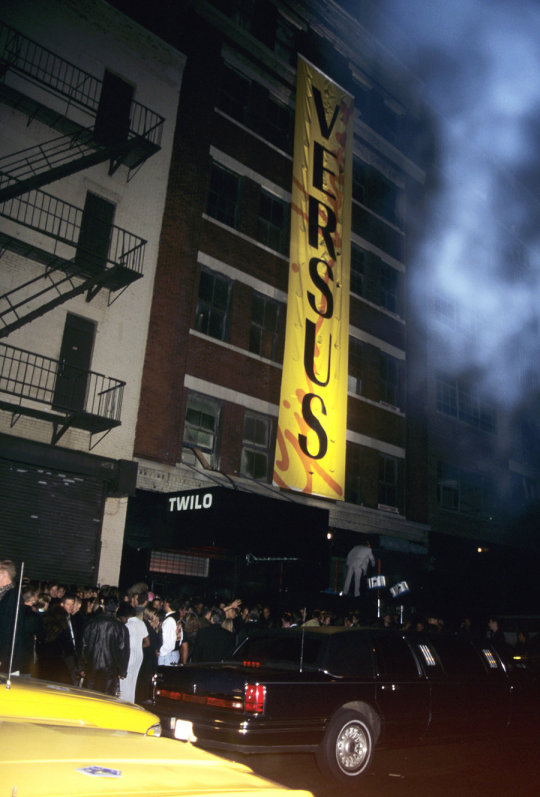


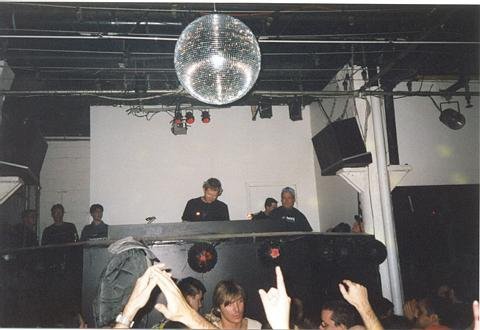
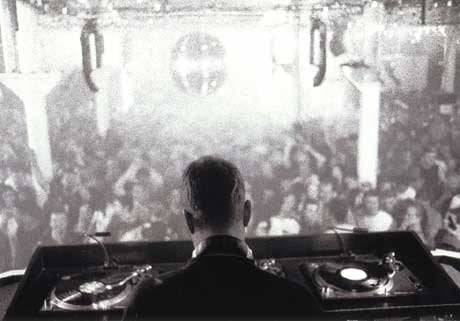
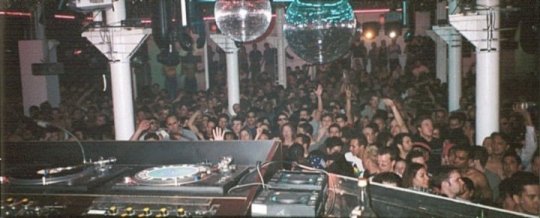
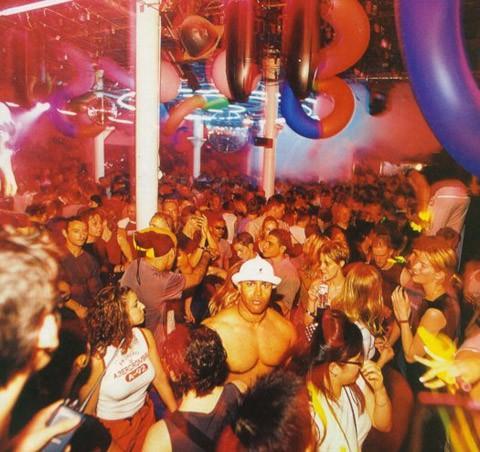

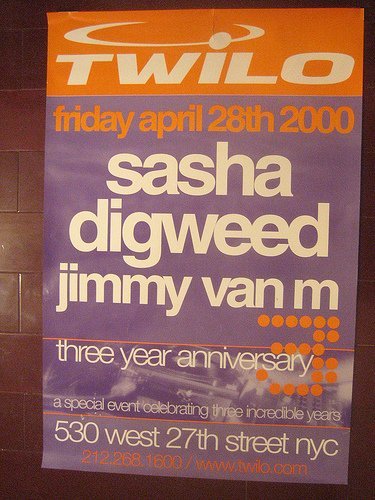
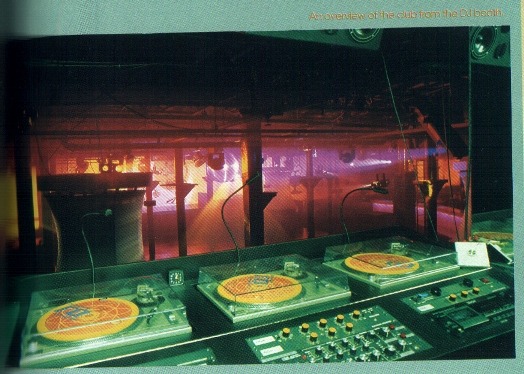


"Until its closing in 2001, Twilo was the most well liked and, its critics charged, most played-out nightclub to grace the streets of New York City since the seminal Studio 54. The gigantic "megaclub" once located at 530 W 27th St in the Chelsea neighborhood of Manhattan regularly attracted a crowd of thousands to its warehouse-like dancefloor. Playing host to dozens of legendary DJs from around the world, the club was instrumental in popularizing international styles of house and trance music within the United States.
The clientele at Twilo was likely the most eclectic of New York's large clubs. On any given night, one could get lost in a sea of college students, office workers, whites, blacks, Hispanics, Asians, ravers, punks and even an occasional clump of goths, contributing to a frenetic energy and harmonious vibe the likes of which, according to nostalgic fans, has yet to be duplicated by any nightspot in the city. Celebrity sightings seemed to be less frequent here than at other Manhattan clubs, a fact that many Twilo regulars considered a plus.
Twilo was also equipped with a state-of-the-art sound system known as Phazon. This sound system, originally built by Steve Dash, was at the time unique to the venue. The sound system at Twilo was highly regarded by patrons and DJs alike for its sound quality. Some DJs went as far as momentarily leaving the DJ booth to hear their favorite records on the dancefloor. "
- From the Facebook page dedicated to memories of Twilo
"Nightclubbing is not a crime," reads a promotional t-shirt for Twilo's monthly techno night, Respect is Burning. Maybe not, but for the line of clubbers outside the popular venue earlier this month, it must have felt that way. A dozen or so cops formed their own line in front and casually surveyed the crowd while the patrons submitted to the complicated security checks required for entry. Above the cash registers, a huge banner blared in capital letters: "UNDERCOVER POLICE NOW ALWAYS ON PREMISES."
These are trying times for the Chelsea superclub. As the establishment embarks on a bid for international fame with the launch of a CD series, a national tour, a magazine, and the startup of its own label, the city is trying to close Twilo's doors for good.
Prompted by two deaths in the last two years, a series of undercover drug buys at the nightclub, and an October 8 incident involving the alleged cover-up by the club's security of three unconscious patrons, the city is suing the club, hoping to shut it down under the Nuisance Abatement Law—a regulation generally used to padlock doors of places involved with prostitution or drug dealing."
- Village Voice, “Trying Times for Twilo”
Spirit (2004-2006)
If you watch only one video, watch this one - hard to believe this was 27th St a few years ago, patrolled by cops on horses!:
youtube
(another video here, showing some very familiar spaces)
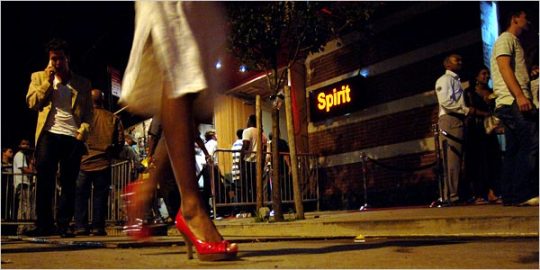

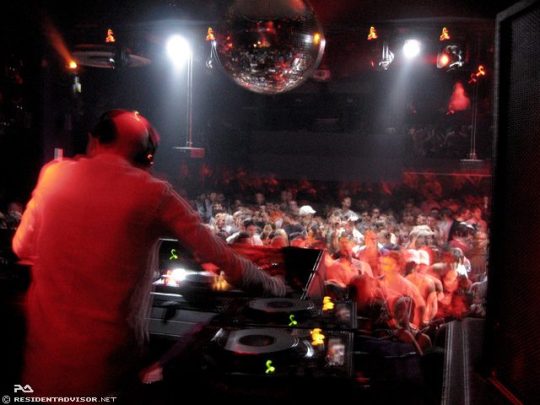




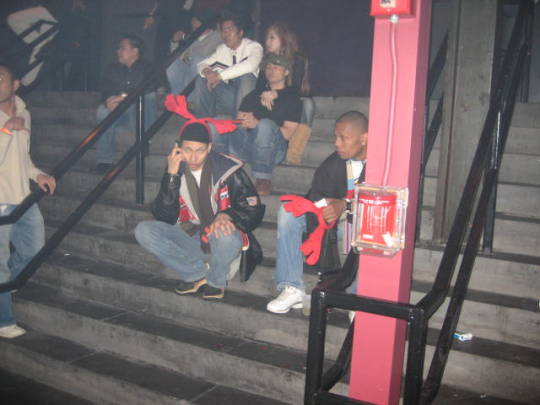
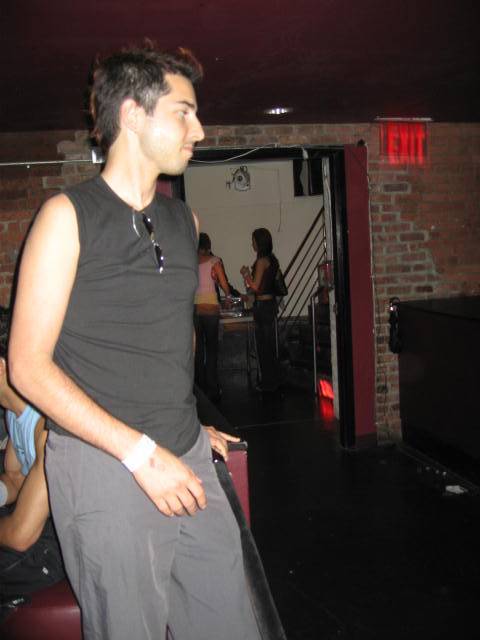
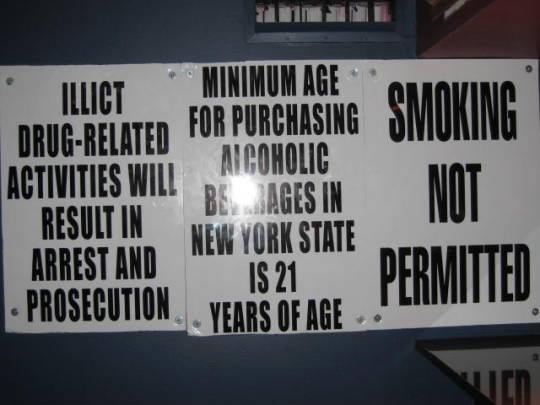
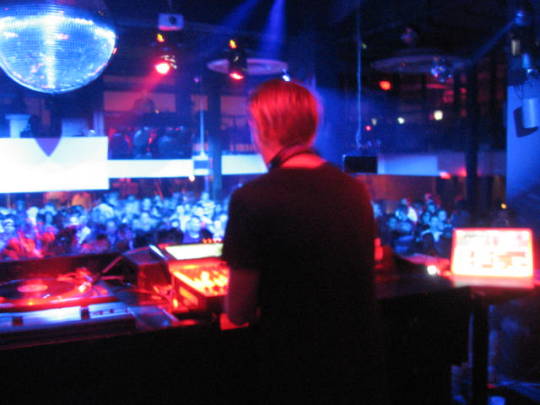
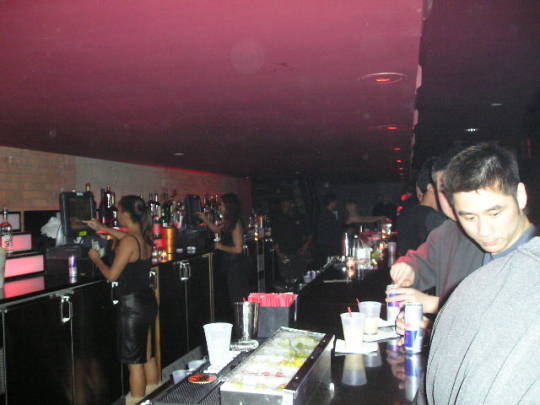

"When this cavernous, multi-level club opened in 2004, it was billed as the antithesis of the warehouse space's former tenant Twilo; this was going to be a spiritual dance palace where you could open your chakras organically (i.e., without pharmacological aid). A noble goal, perhaps, but the pretenses have since been abandoned for a more realistic formula: Loud Music + Lots of Space = Loads of Fun. Stairwells and a balcony overlooking the dance floor create dark kissy corners, while in the open terrain, big beats boom to a non-stop light show including large video-art projections. In the drinking room, a mélange line up at the blue-lit bar while Top 40 hip-hop pops. When the club pulls in marquee house D.J.s like Danny Tenaglia or Judge Jules, there's plenty of skin on display—even if said skin looks in need of more yoga and less liquor."
- NY Magazine
"SPIRIT occupies the hallowed ground which previously housed the legendary nightclubs Sound Factory and Twilo. The gateway is distinctively marked with SPIRIT’s seven point star logo – the symbol of “Spirit” as defined in Native American myth. Entering this passageway to SPIRIT is the start of a holistic nightlife experience and uplifting personal journey. SPIRIT is made up of three distinct zones called MIND, BODY and SOUL.
The point of entry leads through a corridor and directs a pathway to a small mezzanine room. Here, Alex Grey’s art installation “Transfiguration” is displayed as a welcoming spiritual gesture, as are two paintings from Alison Grey. Navigating either of the illuminated staircases downward leads to SPIRIT’s auditorium, BODY.
Each semicircular level is encased in glass and latent with metal work. Moving closer to SPIRIT’s vast 10,000 sq foot center, BODY comes to life. BODY’s ceiling rises increasingly higher and pours upward into a 30 foot cathedral-like expansion. The room is saturated in red to signify the Root chakra.
A level above, the suspended DJ booth overlooks the dance floor of BODY. The VIP area is a visual allurement and luxurious vantage point for a view of the activity below.
The journey upward continues into SOUL and MIND which are both located one level above. The dining area SOUL is a refreshing, intimate place with an extensive “shared-space” table as its’ focal point. SOUL is a restaurant that doubles as a private event and party space. A view of the kitchen is parallel to the panoramic outlook of the dance floor below, through v-shaped sliding glass doors.
Completing the walk through all three zones moves onward into MIND. A waterfall is located just past MIND’s gateway. Just behind a rippling drapery await seven healing rooms, well suited for personal journeys guided by a variety of intuitives."
- Spirit’s description of itself, preserved at ClubZone
“On a Tuesday evening in a dance studio on the fourth floor of the Spirit club, a “mind-body-soul” center in West Chelsea, a crowd of 90 women in belly-baring tank tops and yoga pants and men in baggy T-shirts and running shorts ready themselves for a workout.”
- NY Magazine
"At a full board meeting last Wednesday night at Roosevelt Hospital, Community Board 4 recommended that the State Liquor Authority not approve a transfer of ownership for Spirit, the embattled West Chelsea nightclub at 530 W. 27th St. that was shuttered twice for alcohol and drug violations last spring and summer.
Dealing with the police violations has reportedly cost the club millions of dollars; so, to keep down overhead, the club is currently open only for private parties.
According to C.B. 4 Chairperson Lee Compton, the board’s decision hinged on the club’s difficult history, as well as the oversaturation problem in West Chelsea, where a current total club-going capacity of more than 10,000 patrons has brought myriad problems for area residents, along with a formidable presence by the New York Police Department, which has been coming out in full force on weekends since late July, complete with klieg lights and mounted police. "
- TheVillager.com, 2006
BED (2005 - 2007)
(video here)





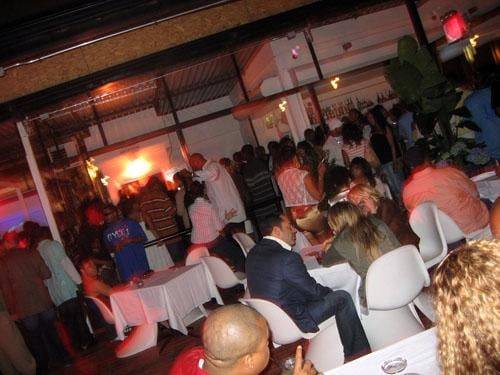



"Located in a bi-level penthouse at 530 West 27th Street, BED New York is the first downtown restaurant to combine two dining floors with a 360-degree rooftop view of the sweeping midtown New York skyline. BED New York measures more than 15,000 square feet and can hold up to 620 guests. The design and concept fuses seductive Miami sophistication with modern New York City style.
BED New York has purposefully created a seductive oasis offering a city escape in the midst of the Chelsea neighborhood. From the street, guests enter a private elevator to be taken up to the 6th floor restaurant where they enter the ritual of the BED New York dining experience. Guests are requested to take off their shoes and slip on specially designed slippers to join their friends on the unique bed platforms designed by Tempur Pedic that line the interior."
- BedZine
“Although the space offers a large open loft area on the main floor, “the deck” has attracted the most attention so far. Beds line the wooden deck and the open air encourages everyone to feel free spirited. DJs play mainly house and hip hop music, but nobody really cares. It’s the fresh air and flowing drinks that keep this place rocking. Be patient at the door, because the freight elevator (20-25 person capacity) is your only way up into this heaven. Expect long lines and frantic, yet experienced club goers. Along with Cain and Home, BED remains one of the key attractions on Bottle Service Boulevard.”
- ClubPlanet
"BED is the most relaxing dining spot in the city—once you get past reservation-takers, bouncers, elevator attendants guiding you to the sixth floor of the Chelsea warehouse, the mandatory entrée requirement, and the automatic 18% gratuity. Huge mattresses with mounds of pillows let you relax with a hot date or a small party, after you place your shoes in a cubby and put on BED’s complimentary socks. Nearly everyone is younger than 30; you’ll also be most comfortable if you’re a model or similarly beautiful person, preferably female. The trance music and slow-motion videos projected on screens attempt to soothe you, as do creative drinks like the blackberry julep, a new, fresh-fruit take on the mint julep. The French cuisine nouvelle has Caribbean and Chinese influences, reflecting BED’s Miami-based older brother. Main courses are also mainly seafood based, such as Caribbean lobster tail on roasted pineapple and celery, with a coconut-ginger sauce for tropical flair. Seared free-range beef tenderloin in Syrah wine sauce is an outstanding cut of meat served on mashed boniato, a sweet potato from Cuba and Florida. Even desserts are playfully inventive. A rare feast for every sense, BED is worth at least one visit. — Timothy Cooper
Reservations are absolutely required for the restaurant and for the upstairs rooftop terrace bar, which has beautiful city views, private draped beds, and a live band—as well as the same exorbitantly priced drinks as the restaurant downstairs."
- NY Magazine
“The all-night party at a vast Manhattan nightclub was meant to kick off a weekend of revelry for Orlando Valle, who celebrated his 35th birthday on Friday with 10 friends.
But instead, according to the police, a fight with a stranger led to a freakish accident, and Mr. Valle, who lived in the Bronx, died after falling head first down an elevator shaft onto an elevator car four stories below.
The accident occurred shortly after 4 a.m. yesterday at B.E.D., a sleek club on the sixth floor at 530 West 27th Street in Chelsea. The police, as well as Mr. Valle’s friends and relatives, said Mr. Valle had gotten involved in an argument between one of his friends and two workers at the club.”
- NY Times (BED closed permanently afterward)
Home (2005 - 2010)









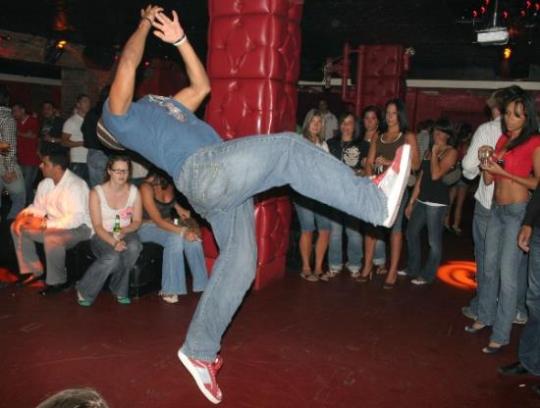
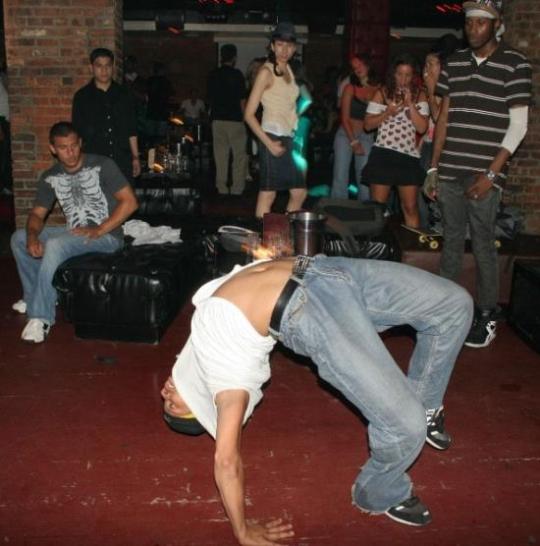
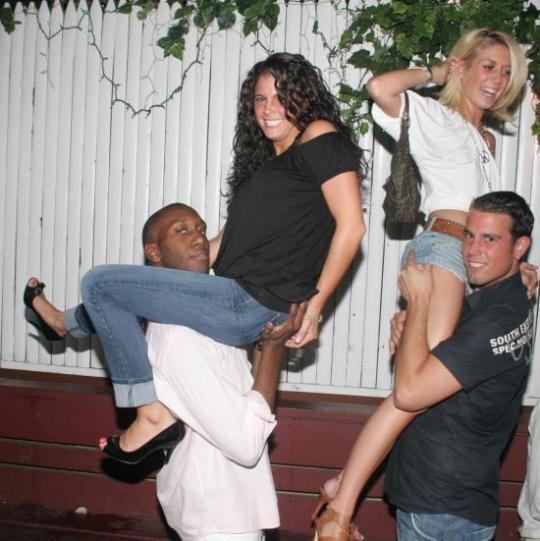
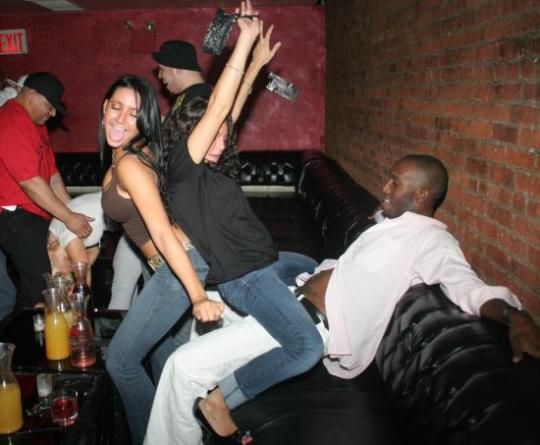
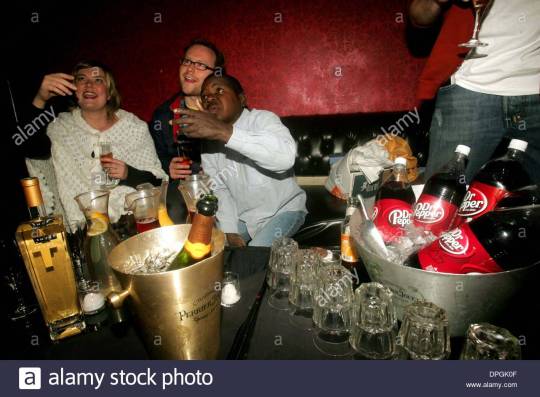
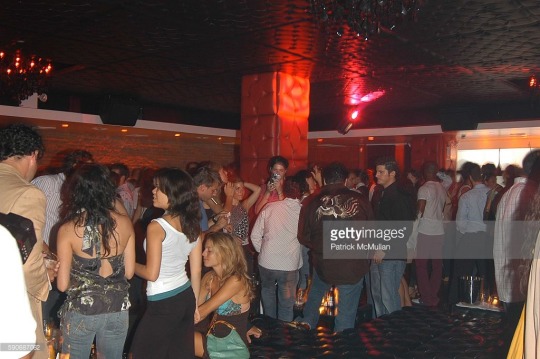
"This cozy nightclub has only been open for a month, but A-listers like Nick and Jessica, Tommy Lee and the Gastineau Girls have already made themselves at home in Home’s leather settees. Dark, red-lit, and windowless, it’s the perfect spot to see celebs who wish to be seen. There’s a two-bottle minimum regardless of whether you're ordering the $200 Moët or the $1500 magnum of Rosé. Reservations required, especially if you’re hoping for a Thursday night table."
- NY Magazine
"We got there around 10 and they weren't open yet. They open at 11. No big deal... we went around the corner to a bar to continue our binge drinking.
We came back after 11... and there was a LINE. For a place that wasn't even busy. A line for a place that just opened. It wasn't a long line... but still a line. We waited, and waited... and then finally they started letting people in.
$20 cover charge. $20?!? Are you kidding? You are going to charge me $20 for a place with no people in it...?
We complained... they lowered our cover to $10. We got in - there were about 5 other people in the place. What the hell was that line for?
The DJ SUCKED and annoyed the crap out of me. At first it sounded like he was just testing his stuff because he kept messing up and music was cutting in and out. Then when the music was playing... he kept turning it down (messing up the beat) and screaming things like "$150 bottles of Grey Goose!" Every single one of our group of 7 was rolling her eyes.
It also made me realize how ghetto the music is I listen to. This place was playing things like TLC's Scrubs and Destiny's Child's Independent Women. Really. Clubs still play that? Am I in middle school again... and is this a roller rink?"
" what I do like about HOME are the large couches that make up the parameter of the two different rooms and the terrace which is awesome and has a ton of seating and tables. I'm sure thats great in the summer time, but i'm sure it gets packed as well. "
- A representative Yelp review
Guest House (2005 - 2010?)



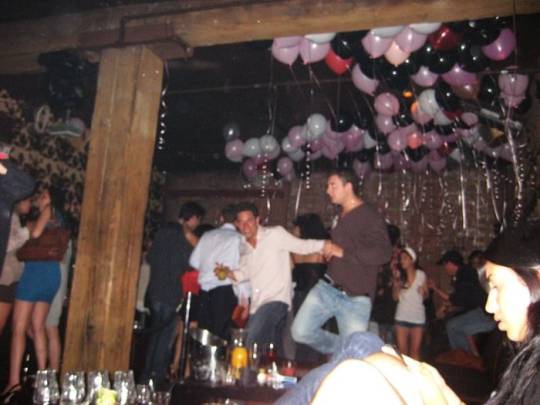

"With its L-shaped, banquette-lined space, Guest House is part lounge, part club, and all pick-up. It's dark. It's loud. And it's packed with eye candy. Adjacent to Home, its slightly older sister, Guest House is part of the dying breed of upscale lounges that actually have an emphasis on dancing. House dominates, but the DJs are known to play everything from Motown to disco to 50 cent…within the span of 20 minutes. With a sexy red glow and cozy tables for bottle service, it also works as a place for that seal-the-deal third date. You want the energy of a mega-club with still a hint of exclusivity? This is it."
- ClubPlanet
"Guesthouse allows you to relax on brown-leather banquettes as you watch beautiful people slink around the intimate space. The candle walls, giant table-length chandelier, low lighting and dark hues are reminiscent of an uber-luxe living room, and remind you that tonight you are a guest in a very different house."
- UrbanDaddy
"It’s not all that unusual to see a patron wearing sunglasses and stilettos (and exhibiting a good deal of flesh) step out of a canary-yellow Lamborghini on her way to this posh boite from the owners of neighboring Home. In the intimate room, she’ll then snag a reserved table for bottle service and take in a soundtrack of house and techno. One wall has a recessed display of hundreds of symmetrically placed candles; another is sheathed in an arresting wallpaper repeating Rorschach inkblots."
- NY Magazine
“It really is just an extension of Home, which just isn't that great to begin with. And, inexplicably, after about an hour, they cut off the bridge that links the two and stopped allowing people to move back and forth. I mean, really, what is the point of having two connecting clubs if you're not going to let people go back and forth!”
“This is a bar version of the show "Jersey Shore" except without Snookie, who is the reason we watch in the first place! Tips:
Guys: have a lot of money and get table service, otherwise don't plan on getting in right away (or at all). We had table service and the actual service was pretty terrible, but what do they care? With their mandatory tipping percentage on every bottle, they don't have to be nice to you. You're lucky you got in the door in the first place, remember? Girls: Make sure you have Mace to protect yourself.“
“I just can't believe that our society (especially in this economy) allows it to still be OK for bars/clubs to make customers fight to get into a place, only to be treated like crap and charged tons of money for a drink that is pretty much water with a splash of vodka on top.“
"They search you like you're an inmate at a correctional facility.
The drinks are expensive.
It's way too small for the crowd it gets on Wednesdays.
The bouncers are crazy, I was allowed to go in between Guesthouse and Home by a family member who is a bouncer and another bouncer almost tackled me and started yelling at me.
It could be nice because it's a nice space, unfortunately it's either B&T, ghetto trash or Euro trash. And the cavity search they put you through scares me... I mean... what kind of people come here?? Y'know those searches are based on it's history w/ it's clientele."
- Reviews from yelp, here & here
"The murder of Jennifer Moore has been described on 27th Street as a Lemony Snicket tale—a series of unfortunate events. Moore and her friend Talia Keenan were carded at the Guest House door that Monday night, but Moore flashed her sister’s I.D. After leaving the club, the two found their car had been towed. When they reached the tow pound on Twelfth Avenue near 38th Street, they were so drunk that the attendants wouldn’t give them their car. Keenan was so far gone that she passed out and an ambulance was called to take her to the hospital. Moore slipped away and was found several days later in a Weehawken Dumpster."
- NY Magazine, see also The Murder of Jennifer Moore
***
Finally - recommended reading “The Short, Drunken Life of Club Row
How 27th Street went from grim to glamorous and back again in five Jäger-soaked years” feature in NY Magazine
"Inside the New York Post office on Sixth Avenue, Sunday editor Lauren Ramsby commanded her reporters to bring her any news they could find about underage drinkers on 27th Street. It wasn’t hard: They were parading down the block in belly-baring tank tops, yelling about how many Jäger bombs they had downed. According to one Post reporter, Ramsby wanted “to blow the lid open” on the underage-drinking scene. “It’s the perfect story,” another Post reporter says. “It’s linked to a murder. You have the villain: club owners. They’re giving alcohol to underage girls. And then you have law enforcement falling down on the job. You have the city-bureaucracy aspect, you have the commerce aspect, you have the stricken family losing their child, you have a little sex involved because she was raped. It can’t get any better.”
Ramsby sent out a team including her youth-culture reporter, Elizabeth Wolff, a slight, loafer-wearing Brearley brunette. Wolff went to the street that weekend and saw the usual scene: puddles of vomit, women without shoes, men brawling, bouncers hoisting and tossing drunks onto the sidewalk. Some did not look like they would survive the night. “There was this girl—she had been walking toward Eleventh Avenue from B.E.D.,” Wolff recalls. “She had no shoes, she was drooling, and she looked like she was dead. She didn’t look like she was breathing. She just collapsed. Her friends were worried, but, of course, they had lost their other friends. So there was this, ‘Where do we go? What do we do? Do we get our friends?’ Eventually a cop came over and lifted her head and got an ambulance, but she was lying on the ground for 25 minutes before one came.”
By the next weekend, the police had flooded the zone. In the early weeks, there were at least 40 officers, some on horseback. They also brought floodlights, a digital flashing sign warning clubgoers that it’s a crime to show a false I.D., and a large bus, or, as the NYPD calls it, a “mobile command center.” Most serious for the club owners, the police forbade cars from passing through. They even stopped the restaurateur Roberto Vuotto of Naima, who had just run out of fettuccine, from driving in with a fresh batch from the Lower East Side.
“It’s a good block,” says Jon B. “Some people like to be in the middle of the craziness.” He plans to expand into the old Spirit space, taking over another floor in the old Twilo building. “This should be the club district.”
The police and barricades and blinding lights shifted the makeup of 27th Street. It’s now a stressful place for celebrities who seek a modicum of privacy. Shaq, who not long ago agreed to attend a party at B.E.D., gamely removed himself from his car at the Tenth Avenue barricade and tried to walk down the street. By the time he reached the club, several hundred revelers had surrounded him and he almost seemed to be dragging the crowd along. Bono, who recently planned to attend a Massive Attack party at B.E.D., reached the barricades, saw the crowds, and decided not to get out of his car. But for every celebrity or scenester who has abandoned the street, there is someone like Scott Jones, a plastics salesman from Hoboken, who comes to take it all in. “The cops got it blocked off,” he says of the block, “so it must be something, right?”
***
Note: You should probably still direct newbies to the ScoutingNY version of this history instead. :)
23 notes
·
View notes
Text
Dig8al Media and Cultural Life: Male Fandoms 🤖
Throughout history and most of digital media produced today, the male gender is commonly portrayed as being physically powerful, one who will ‘take care’ of his woman, one who is emotionally strong, tall and masculine. It is this idealised form of masculinity which creates hegemonic masculinity and the idea of ‘the ultimate man’. This idealized form however, can sometimes cause men to become alienated as it is extremely hard or sometimes impossible for men to embody this idealized form completely. This idealized form of the male gender is the reason behind male fandoms being considered ‘nerdish’ or ‘boyish’.
A fandom can be described as a community or group of individuals who share the same interests in a specific cultural form. Fandoms can exist in almost every facet of sport, culture, movies and books where individuals across the globe join together in shared interests. Certain fandoms are usually looked down upon by adults as they are believed to represent a certain amount of ‘childishness’ or ‘immaturity’. According to Bulck et. al. (2016), the media often represent fandoms in a negative light, scorning it as an extremely abnormal worship of celebrities or represented in series such as The Big Bang Theory, an extreme form of ‘nerdness’. This negative view, however, has now been outdated in fandom research and academic theory as fandoms are now considered to be a part of everyday lives of ‘normal people’ (Bulck et. al., 2016).
The existence of female fandom is prevalent but are characterized as “celebrities and collectibles, misfits and crazies, a lot of overweight women and a lot of divorced or single women” (Jenkins, 1992: 11) who have little to no life apart from their obsessions with these programs. It is interesting to see that female fans are represented as being “screaming teenage girls who try to tear the clothes off the Beatles or who faint at the touch of one of Elvis’s sweat drenched scarves” (Jenkins, 1992: 15). Whereas male fans are almost always depicted as being less masculine than those who are well-built, successful, good looking and those who have girlfriends.
The stigma which surrounds male fandoms are correctly identified by Jenkins (1992: 9), when he described Star Trek fans (Trekkies) being satirized as, “nerdy guys with glasses and rubber Vulcan ears, ‘I Grok Spock’ T-shirts stretched over their bulging stomachs”. The article also indicates that William Shatner (Captain James T. Kirk in Star Trek) was asked numerous questions by fans wanting to know about minor roles in episodes, which they had memorized the title and sequence numbers of, to which he replied in frustration “Get a life, will you people? I mean, I mean for crying out loud it’s just a TV show!” (Jenkins, 1992: 9). Shatner then moved on to motivate the fans to move out of their parent’s basements and embark on adult experiences, such as kissing a girl for the first time, and putting their fannish interests behind them. It is clear from these frustrated outbursts the kind of stereotypes that males face when being a part of a fandom. Not only are they mocked incessantly, they are also regarded as not having a life and not being mature enough to have moved out of their parent’s basements.
Jenkins (1992) lists the kind of popular stereotypes that comes with being a male Star Trek fan, such as, being considered to be passive consumers who will buy anything, without a second thought, which are associated with the program or its cast. The memorization of the episodes and its titles are supposedly an indication of their devotion to the ‘cultivation of worthless knowledge’ (Jenkins, 1992: 10). The comment made about these fans to ‘get a life!’ indicate that they are regarded as social misfits who eventually become so obsessed with Star Trek that it prevents any other type of social experience from occurring. When Shatner asked fans if they had ever kissed a girl, it was clear that the common misconception of this male fandom was that these men had become feminized or desexualized through their engagement of this mass culture (Jenkins, 1992). Lastly, a common stereotype and misconception is the idea that male fans are unable to separate fantasy from reality as they become too engrossed in the life of Star Trek.
These perceptions of male fandoms are extremely problematic as people do not acknowledge the advantages of being in a fandom. Fandoms allow individuals to connect with each other on a global basis at conventions. According to Bulck et. al. (2016), these male communities are shown to function as a way to belong to a group and share a passion where fans indicate that “for me, these are all friends and soul mates”. According to an article written by Sloat (2015), one of the elements that are crucial in being a part of a fandom is the identification with a larger community. Fandoms can become a ‘psychological construct’ which includes a feeling of belonging, identification and involvement. She indicates that the drive to be a fan can sometimes be perceived positively by family or peers who are existing fans of the fandom. Sloat (2015) also puts forward the idea that identifying with a fandom can be seen to act as a barrier against estrangement and depression as it creates a positive self-esteem and well-being. She indicates that 198 cosplay participants were asked why they chose their costumes and their answers were “that they were excited about how good they were going to look wearing it” (Sloat, 2015). Lastly, she puts forward the idea that fans tend to be critical thinkers as they tend to become textually proactive and productive in their reception practices as they analyze and directly involve themselves in scenario’s and situations. Male fandoms can also provide an escape from real world problems for certain individuals which are beneficial when moderated. For male fans it can also create a level of excitement and faith in something other than religious beliefs, which some individuals need to motivate themselves in other facets of life. In conclusion, male fandoms are stereotyped by digital media and society in a negative manner, but societal norms fail to take into consideration that being in a male fandom is in fact beneficial to these individuals.
References
Jenkins, H., 1992. 'Get a Life!': Fans, Poachers, Nomads. The Cult Film Reader, pp.430-43.
Van den Bulck, H., Claessens, N., Mast, J. and Kuppens, A. 2016. Representation of fandom in mainstream media: Analysis of production and content of Flemish television’s Superfans. European Journal of Cultural Studies, 19(6), pp.513-528.
Why Being a Fan is Good for You Article Link
0 notes
Text
I finally actually finished the first draft of my first chapter for my novel! It only took a few months, but hey! I don’t know how to start the second chapter, and I’m still not entirely sure on why the characters actually join together, but still, its a start! If you have any criticism (if you read it) feel free to share it with me! I’d prefer constructive criticism, but if you just want to tell me its crap, thats fine! It won’t destroy my self esteem (because I don’t have any anyway!) Most of it is under the cut thingy because its like 3000 words.
It was a relatively average night for a country village. There was a spot of rain, but the kind of rain that struggles to make a person even slightly damp, rain so light it’s almost as if it apologises for each little drop that hits. “Oops, I’m awfully sorry” the rain might say “I really hope I didn’t make a mark.” It’s awfully polite rain. The village, though small, had everything a person could need (as long as that person is a medieval peasant). It had a some stalls to purchase goods, farms to work, a Blacksmith's shop, and the two most important buildings, that would remain a vital necessity for every Christian town, city and village for centuries; a place to worship, and a place to get drunk afterwards.
Candle light could be seen glowing in the church, even though it was in fact completely empty. The tavern, on the other hand, was packed. Of course this shouldn’t be a surprise; drinking is a lot more fun than praying, even the priest and monks agreed. Hell, at a time when even drinking the water would probably kill you, getting drunk was one of the few pleasures people had. And since the water was likely to give you a minor case of death, it was much safer to drink wine and mead, and so getting drunk was just a daily fact of life. The tavern was quite large, with plenty of wooden stools and wooden tables, most of which were occupied by drunken men and women (and some drunken children). The owner, a large bald man with a crooked nose, a large scar along his right cheek from some previous bar fight, but a very welcoming smile, was behind the counter serving people drinks, whilst his two daughters, Camilla and Magdalena, were running about carrying food and collecting the tankards. Camilla was a large woman, with her father's crooked nose, long blonde hair in a bun, and brown eyes. Magdalena was thin, and had her father's welcoming smile, but unlike her sister had brown hair. Both were beautiful in their own way, and both were often the victim of unwanted advances from some of the non-local male patrons, which often didn't end well as Magdalena had a hell of a right hook, and Camilla often used it as an opportunity to pick the man's pocket.
The tavern was often a noisy place. That night was no exception. And one table a drunken coachman was telling tales no sober person would believe, but the men and women at his table were not sober and took him at his word. At the bar itself sat a large drunken monk with a big walrus moustache. He was one of those people that would be incredibly forgettable if it weren't for one single feature. For this monk it was his moustache. It was so memorable that people simply called him Friar Moustache, which he believed to be a term of endearment, but was in fact because not a soul in the village knew his actual name, not even the priest (who was at this point sat next to Friar Moustache resting his head on the bar, drunkenly mumbling incoherently). Friar Moustache was leading a choir of drunken men singing a popular drinking song. There were a lot of harrumph's and ho's, and a great deal of crude language and descriptions of various lewd acts. The only one more enthusiastic about the song than Friar Moustache was an old man, possibly in his early to mid sixties, known to the villagers as Ser Malcolm the White. He looked a bit like a mid-sized bear. Well more accurately, a mid-sized, shaved, pink, often slightly drunk, bear with almost shoulder length curly white hair, a scruffy white goatee, a wrinkled face, and tired eyes. His accent was surprisingly similar to the modern Glaswegian accent. He had once been a knight who fought for glory and honour and place in the history books, but he never won any of those things. All he did was age, and now the only fight he had was the one to get out of bed each morning, which was getting harder every day.
On a table near the back of the tavern sat a young man just holding a tankard. His skin was pale, his eyes were wide, and tired looking. He gazed ahead of him as if he were staring into the abyss itself. This young man was an unfortunate peasant by the name of Glenn, and earlier that day he had died, which was causing him a great deal of distress. Now, many may think ‘well, he doesn’t seem that dead, he seems pretty alive.’ And those who do think that would be correct. He was in fact very much alive.
“Don’t worry, got this this” Glenn had said to the huntsman, as the boar began charging.
He did not. You see, longbows require a lot of upper body strength, which weedy, little Glenn didn’t actually possess. Why he had been given a bow by his father, it’s hard to tell. Perhaps his father hated him, which actually seems quite likely; he did have several more capable siblings. He managed to pull the bowstring back only a little before releasing, causing the arrow to travel only a couple of feet in a downward arch until it landed on the ground in front of him, seconds before the boar collided with him, knocking him to the ground. It would have actually been a little funny if he weren’t about to die. The huntsman tried to stab the beast with, but he missed, and the boar narrowly missed him. He immediately decided the best course of action was to run away before he was killed. The beast chased him off a little before turning back towards Glenn. By this point he had managed to get to his feet, but his head was still spinning, and he was very unsteady on his feet. The boar looked more like a monster than anything else now. It looked almost the size of a cow, with huge sword length tusks either side of its incredibly large snout. Of course, it was not in fact that size, or even especially monstrous. It was an average boar, but in his panicked, and dizzy state, his imagination had gone mad. He attempted to stagger away, with little success. He stumbled just as the beast charged at him again, and this time immediately gored by the creature’s tusks. It was a rather unpleasant sight, huge gashes into the poor man’s flesh from the beast’s tusks. Spaghetti sauce or blood gushed out of the wound, covering his shirt. It was probably blood. Either way, it would stain. The world around him began to dim, and the last thing he saw was the bloody beast wandering off back into the forest.
Okay, so it wasn’t the last thing he saw. Not long after, he awoke to find himself still in the forest, and caught a glimpse of the beast’s backside as it wandered off. For a second he froze and held his breath, but when he was sure the boar wasn’t going to charge again, he sat up, and touched him side. He found two large, deep gashes from the boar's tusks on his right hand side that should have killed him as far as he was aware, but there was no blood. He stood up, and looked back to where he had been lying. His eye widened.
“Holy mother of god!” he screamed, on the edge of tears. Lying there, at his feet, was him. Well, more accurately, his body. Even more accurately, his very bloody body, with the exact same wounds he had. He stood there, staring at his own corpse for a while, sobbing in a very gross, ugly fashion.
He was disturbed from his silent mourning by the sounds of loud slurping. He turned to see a skeleton in a large black hooded cloak, and bright blue fluffy bunny slippers, drinking something from a ceramic mug covered in little colourful fish. The being was reading a newspaper (of course, Glenn had no idea what a newspaper was, as they wouldn’t be a thing for a few more centuries, he was also mostly illiterate, so it just looked like a piece of paper with squiggles one – which is all anything is really) and hadn’t noticed him. He coughed a little to get the being’s attention, with no success. Whatever they were reading in the paper, they were engrossed in it. The being took another large, loud sip from his fish mug, and spoke. “Hmm, four down, five letters, unpleasantly bitter” said the being in an almost ethereal, other worldly voice. The being reached to put their mug down on a table that wasn’t there. The mug fell to the ground, and smashed. The being looked up from his paper, and down at the broken mug, then looked at Glenn, then back at the mug, then back to Glenn. Now, without an actual face the being couldn’t really provide any facial expression that would suggest just how annoyed they were, but they were incredibly annoyed, and would have scowled at Glenn if possible (which it wasn't). They were so annoyed that they gave of this feeling of deep, intense annoyance, that even the dimmest of people could pick up.
“Oh great” said the being sarcastically “another dead mortal, just what I wanted.” Glenn shuffled awkwardly and didn’t say anything. He tried to avoid making eye contact. He didn’t want to make the skeletal being even angrier by saying something stupid. It did not work.
“I was happily doing my crossword, drinking my coffee, but you just had to die, didn’t you?” continued the being, slowly becoming less sarcastic, and more openly angry about having been disturbed “bloody mortals, I hate this damned job.” At this, Glenn was confused.
“What job?” he inquired
“Oh for goodness sake, do I have to go through the entire spiel?” replied the being
Glenn shrugged and nodded awkwardly.
"It might help a bit" he said. The being groaned at this and would have grimaced if he could have.
“Very well. I am Death, claimer of souls, destroyer of worlds, and you died” said Death reluctantly “I’m here for your soul blah, blah blah, take you to the afterlife and all that crap so you can be judged by some jumped up little prick” Glenn just stood there, slightly stunned by the fact that he was talking to death, but also a little underwhelmed. He expected more from Death, though he couldn’t tell you exactly he expected. He definitely would have preferred someone nicer.
“That it?” he said after a few moments of silence.
“I’ve been doing this for a while buddy, and honestly I can’t be arsed with this” replied Death tiredly. They stood in silence for a few minutes. Glenn wasn't sure what to say to this eternal cosmic entity. Death was beginning to think they should have listened to their mother and become a butcher (though in a way, being the grim reaper isn't all that much different to being a butcher, at least, that was what he had said to her).
“So, mister Death, sir” began Glenn ending the awkward silence.
“Now listen here mate” said Death, interrupting the recently dead person “I am a skeletal cosmic freaking entity that exists outside of space and time, I really do not have the time for the restrictive genders of you mortals”
“Oh, right, sorry” responded the recently deceased Glenn “you could be a bit nicer about it though, I have just died!.” He gestured to his still warm body, that was lying in a pool of his own blood, and was being pecked at by a bird that looked a bit like a raven, though since Glenn knew nothing about birds, especially ravens, he wasn’t entirely certain.
“Mate, shut up” said Death “God damned mortals!”
"But what now though?" asked Glenn, ignoring Death, "do I go with you? Or am I stuck here?"
"Honestly, I don't care mate, do what you want" replied Death exasperatedly "I just want to go back to my crossword, but now I have to deal with all the sodding paper work!"
"Could you just let me go back to being alive?"
"Not likely, I mean look" Death said as he pointed at the corpse being pecked at what might not have been a raven "you are pretty obviously dead."
"Oh, right" responded Glenn gloomily "I understand."
"Although" began Death craftily
"Although what?"
"You could just be mostly dead"
"How can I be mostly dead?" asked Glenn confused by the whole situation
"Well, you personally are obviously properly dead, but sometimes people are a little bit alive, and in those circumstances, I can let them go back to being alive"
"Okay!" responded Glenn excitedly.
"And thankfully there is no paperwork because you were alive" continued Death happily, using his skeletal fingers to do air quotes around the word alive "plus I don't have to deal with you anymore, so go on back." Glenn nodded and followed Death's orders. He lay down on top of his body, and closed his eyes. He took a deep breath, and then winced in pain. His eyes shot open, and he sat up, covered in his own blood, shirt ruined, glad about not having to be dead, but understandably still rather shaken by the whole experiences.
"Oh, by the way, don't die again anytime soon, because if you do I'll make you regret it" said Death threateningly before grabbing his newspaper and disappearing.
"Helloo, anyone home" said a woman's voice startling Glenn a bit, causing him to drop him his empty tankard. It was Magdalena.
"Ah bollocks" exclaimed Glenn
"Watch your language Glenn" responded Magdalena feigning offence
"Sorry Maggie, I was someplace else" explained Glenn
"No worries sweetie" she said reassuringly "is everything okay? You look like death." Glenn reached for his side. His shirt was still a little damp with his blood. It was probably some sort of health and safety violation for him to be in the tavern, but they didn't have health and safety, which should explain a great many things, like why there were so many things that could end your life prematurely.
"Its..err..I'm fine?" he replied, though it came out as if he were asking a question.
"Oh that's great sweetie" said Magdalena, completely uninterested, she wasn't really paying attention. The tavern was busy and Glenn was one of those people who you could easily forget about. She grabbed his tankard and got back to work.
The singing had all but come to an end, even Ser Malcolm had stopped. The only one still singing, if you could call slurring most of the words and forgetting the others singing, was Friar Moustache. He was swaying a little one his stool and swinging his arm about, seemingly forgetting he was still holding a half full mug of mead. His big finish came, and he leant back on his stool and toppled over, flinging his mug into the air, which quickly came crashing down onto the head of another drunken patron.
"oi, Wheresh me drink gone?" slurred Friar Moustache "were in me han!"
He struggled to get back up onto his feet. Camilla walked quickly over to see what the commotion, and bent down. "Let me help you Friar" said Camilla. He smiled at her a great big stupid drunken grin.
"Yur a riight goodun" he replied taking her hand and letting her pull him up.
"You need to go home Friar" said the owner in a thick almost Lancashire accent from behind the counter "You've had a bit much mate."
“Iamsickofyourshit,” Moustache said, his words tumbling from his mouth in a rush of barely distinguishable syllables. The owner nodded to his daughter, and a couple of his larger, more sober patrons, who grabbed the drunken holy man, and tried to escort him calmly out.
“Gerroff me!” he said. “I’m ash sober ash ‘m gonna git. And nuffink I - wait wait wait - nuffink you can do ‘boutit.” He shook free of their grasp, and ambled back to the bar without so much as hiccup in their direction. The owner was much less polite after the first attempt.
"Just carry him out" he ordered a couple of patrons.
"Gerroff! I'm a man o cloth" objected Friar Moustache "I'ma have words with god if ya don't gerroff." The ignored him, and carried him through the tavern, whilst the other patrons simply ignored what was pretty average for a Sunday evening.
They carried him through the door and dropped him on the ground. "Sorry Friar" said one of the men who had been carrying him. The friar rolled over and struggled to get up, but refused to any offer of help from those who had just chucked him out.
"Itsh fine, gerroff" he said "I can do it meself." The men looked at one another, shrugged and went back inside. The friar climbed back onto his feet and stumbled forward. He grabbed a wooden hitching post for support. He clung there, slack-jawed and slumped over, for a long time before he began staggering away from the tavern towards the church. He was planning to have a bit of holy wine before heading to bed. It was dark, and the polite rain had become proper rain. He was drunkenly mumbling angrily to himself about having been thrown out of the tavern. He was insistent that he wasn't that drunk, even though he was barely able to stand, or string a sentence together.
As he approached the midway point between the tavern and the church he noticed a very bright, almost blinding light out of the corner of his eye. He turned, and walked towards the light.
"Whasis? Whas goin on?" he exclaimed, though still slurring his words "Lord is tha you?"
Friar Moustache walked into the light, and fell backwards with a loud 'oof'
"Watch where you're going, drunk prick!" yelled a feminine voice, coming from the light, as it seemed to float round the friar and wandered towards the edge of the village. Moustache sat there for a minute, his mouth agape, shocked. After a few minutes of watching the light float away, he drunkenly climbed up onto his feet, looked towards the church, then at the tavern, then at the church again, made the sign of the cross, then staggered back towards the tavern.
#my writing#ramblings of a personal nature#writing#I don't know if anyone wants to read it#but ah well
0 notes